ala breve
In this issue...
2014-15 AMEA Schedule of Events
Phi Beta Mu “Tips That Click”
An Unexpected Invitation: A Collegiate’s Perspective


The Importance of Music Study - Edward Lisk
Why I Want To Be A Music Educator (FAME Scholarship Essay)
Listen and Learn: The key to Successful Secondary General Music Education

Campus Connections
2015 AMEA In-Service Conference Quick Facts
August/September 2014 www.alabamamea.org
the official publication of the Alabama Music Educators Association

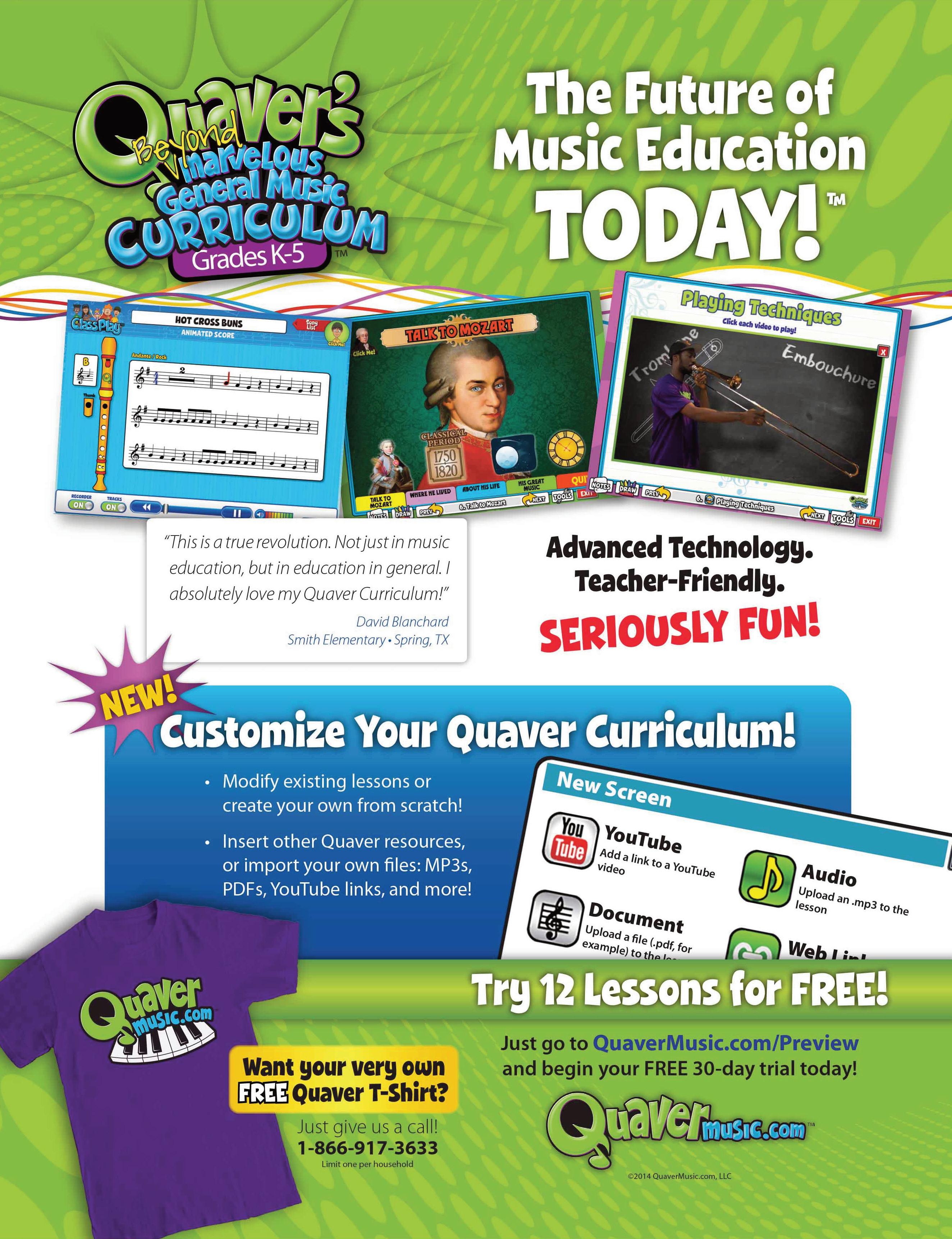
breve ala breve
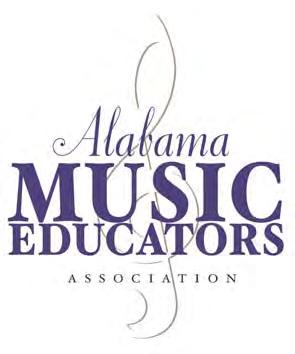
















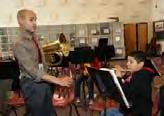


American College of Musicians.............32 Arts Music Shop, Inc................back cover AU Bands Marching Honor Band..........37 AU Music Department.............................8 AWB/Wayne Broom.................................9 Gadsden Music Company.......................16 Group Travel Network....inside front cover Huntingdon College Bands.....................42 John M. Long School of Music (Troy)...24 Join NAfME/AMEA...............................34 Landmark Travel.............inside back cover Mouchette Enterprises............................26 Music Advocacy Groundswell................40 NAfME Collegiate .................................25 NAfME In-Service Conference..............15 QuaverMusic.com.....................................7 UNA Department of Music.....................29 UA Bands................................................11 University of Montevallo........................19 University of South Alabama Bands.......12 University of South Alabama Music.......33 Yamaha...................................................21 Index to Advertisers the official publication of the Alabama Music Educators Association August/September 2014
News/Features 5.....................................................................................................AMEA Directory 10....................................................................2015 AMEA Conference Quick Facts 18 .............................................................................Phi Beta Mu “Tips That Click” 20........................................................................AMEA Presidents - Past to Present 22 ............................................................................................Campus Connections 22..................................................Minutes of the AMEA Governing Board Meeting 23...........................................An Unexpected Invitation: A Collegiate’s Perspective 26 .......................................................................... The Importance of Music Study 30 - 31.................................................AMEA State and District Calendar of Events 32.........................Why I Want To Be A Music Educator (FAME Scholarship Essay) 35 .............Listen and Learn: The key to Successful Secondary General Music Education 39.............................................................AMEA Industry/Institutional Membership Forms Departments 6.................................................................................................................President 9 ..............................................................................................................Collegiate 10......................................................................................................................HED 13.......................................................................................................................AVA 14..................................................................................................................................AOA 17......................................................................................................................ABA 20..........................................................................................................................Elem/Gen 38....................................................................................................................................Jazz 40................................................................................................................Research 36 .........................................................2015 AMEA Conference Pre-Registration Form 41............................................................................................FAME Registration Form Visit www.alabamamea.org to download the following forms: 2015 Conference Lobby Performance Application AMEA Young Composers Competition Application Outstanding Administrator Award Nomination Form Outstanding Music Educator Award Nomination Form Outstanding Young Music Educator Award Nomination Form Barbara Odom Distinguished Service Award Application AMEA Hall of Fame Nomination Form Need information about your NAfME membership? Contact NAfME Member Services at 1-800-336-3768 or MemberServices@ nafme2.org www.nafme.org Music Education Orchestrating Success tionformain NAfM our about y n E tNAfME Contac t es a Servic r -336-3768 1-8 g.or nafme2 MusicEducation cess ting Suc Orchestra 4 August/September 2014
ala
AMEA Governing Board 2014-2015
President Carl Hancock University of Alabama Box 870366 Tuscaloosa, AL 35487 (205) 348-6335 chancock@bama.ua.edu
President, ABA Rusty SmithsCourson Station High School P.O. Box 253 Smiths Station, AL 36877 (334) 664-4435 courson.rusty@lee.k12.al.us






Past President Sara GreystoneWomackElementary School 300 Village Birmingham,Street AL 35242 (205) 439-3200 saratwomack@gmail.com

President-Elect Susan Smith Saint James School 6010 Vaughn Road Montgomery, AL 36116 ssmith@stjweb.org
Executive Director Editor, Ala Breve Garry Taylor 1600 Manor Dr. NE Cullman, AL 35055 (256) 636-2754





amea@bellsouth.net
President, AOA Sarah Schrader 320 Lee Rd. 23 Auburn, AL 36830 (334) 728-2855 burkart_sarah@yahoo.com



Treasurer/RegistrarPat POAMEAStegallRegistration Box 3385 Muscle Shoals, AL pstegall@mscs.k12.al.us35661

Recording Secretary Carla Gallahan 212 Smith Hall, Troy University Troy, AL 36082 (334) 670-3502 School cgallahan@troy.edu




President, AVA Carl Davis Decatur High School 1011 Prospect Drive Decatur, AL 35601 (256) 559-0407
carlbethemeryellen@gmail.com






Industry Representative Becky Lightfoot Arts Music Shop 3030 East Blvd. Montgomery, AL 36116 334/271-2787


AMEA Collegiate Advisor Ted UnivesityHoffman of Montevallo Station 6670 Davis Music Building 308 Montevallo, AL 35115 (205) 665-6668
ehoffman@montevallo.edu
President, Higher Education James Zingara UAB 231 Hulsey Center Birmingham, AL 35294 (205) 934-7376 jzingara@uab.edu

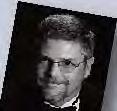
President, AMEA Collegiate Stacy UniversityDaniels of Montevallo (205) 215-8768
sdaniel4@forum.montevallo.edu
President, Elem/Gen Karla Hodges Rock Quarry Elementary 2000 Rock Quarry Dr. Tuscaloosa, AL 35406 (205) 759-8347
karlahodges@gmail.com
beckyl@artsmusicshop.com ala breve
Unless otherwise indicated, permission is granted to NAfME members to reprint articles for educational purposes. Opinions expressed in this publication are not necessarily those of AMEA or the Editor. All announcements & submissions are subject to editorial judgement/revision.The Alabama Music
Association is a state unit of NAfME: The National Association for Music Education, a voluntary, nonprofit organization representing all phases of music education in schools, colleges, universities,














































institutions. Active NAfME/AMEA membership is open to all persons engaged in music teaching or other music

Ala Breve is published four times a year (August, October, February & May) by the Alabama Music Educators Association. Subscription for members is $4.00 per year as part of annual NAfME/AMEA dues. Subscriptions for non-members is $15.00 per year. Bulk rate postage paid at Dothan, AL. Garry Taylor, Editor & Advertising Manager 1600 Manor Dr. NE Cullman, AL 35055 (256) 636-2754 amea@bellsouth.net ADVERTISING & COPY DEADLINES Fall - August/September (Back to School) issue: July 15 Winter - October/November (Conference) issue: September 15 Spring - February/March (All-State) issue: January 15 Summer - May/June (Digital Only) issue: April 15 ala breve 5
Educators
and teacher-education
education work.
theofficialpublicationoftheAlabamaMusicEducatorsAssociation August/September 2014 www.alabamamea.org In this issue... 3-1 AME S h fEv P Be Mu s T t C C us n n
Welcome back friends. With this first column, I want to take a moment to outline where we are today and what I will work on as your President. I am excited about serving and humbled by your faith and trust. But first, let me recognize the efforts of our Executive Director and Ala Breve Editor, Garry Taylor, for making our Association an efficient and sound organization. He is beginning his 10th year as our ED, and we are fortunate to have his experience and wisdom on the Governing Board. I also want to honor the resolute leadership of our Past President, Sara Womack. Vision is difficult to come by. Yet, Sara’s “goalposts” established a strategic direction for our Association. Because of their leadership, I believe we see farther than before and therefore can set an ambitious agenda for the future.
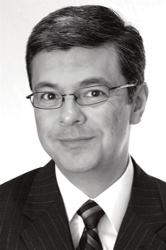
Four Milestones




As your President, I will focus the governance of the AMEA on meeting four major milestones. The first milestone will
between our music divisions, active members, other organizations, and school administrators; and fourth, I will work to elevate efficiency in our organization by transforming aspects of our governance structure.
1. Establishing Connections

Professional Outreach. Our Association must establish connections with leading and rising stars to create new opportunities for professional growth and in-service education. Since June 1, the AMEA began an active campaign of strengthening relationships with professionals from across the US by inviting educators in choral, band, elementary, strings, and general music to contribute articles written exclusively for the Ala Breve. Our first contributor is the noted conductor, clinician, and author, Edward S. Lisk. His article titled, The Importance of Music Study, offers a clear argument for music education and challenges us to embrace our role as advocates for music education.
intelligence, or social development? To further understand these connections as an organization, I invited Dr. Robert Duke, NAfME’s Chair of the Society for Research in Music Education to attend the 2015 inservice conference and talk about how educators and musicians develop expertise.
Music Business Connections. Music businesses are an important part of our state’s economy and visible supporter of the arts. As your President, I will continue to cultivate this mutually beneficial relationship and make our in-service conference inviting to merchants and publishers. I am pleased that Becky Lightfoot (Art’s Music Shop) will continue to serve on the Governing Board as our Industry Liaison. This year, besides the many merchants who come to the inservice conference and guests sponsored by our divisions, I invited the FJH Music Company to sponsor a reading band and clinician to expand our relationships with other national enterprises.
involve establishing connections with nationally recognized advocates, teachers, scholars, and musicians to enhance the quality of our in-service learning. For the second milestone, we will work on escalating advocacy by engaging members of our state legislature through data-driven arguments and music performances. Third, I will work on enhancing communications
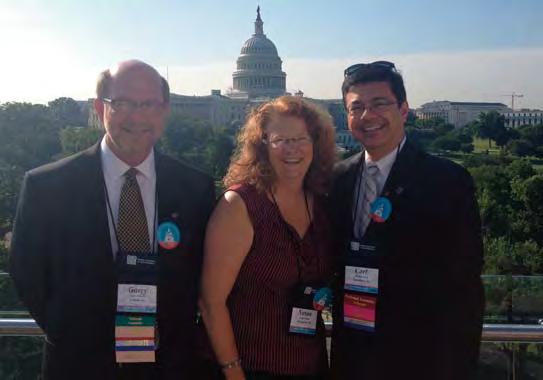
Special Clinician’s Fund. To encourage nationally recognized luminaries to take part in our in-service conference, I asked for the AMEA Governing Board to pass a budget that included allocations for the elementary, vocal, and band divisions to solicit and support nationally recognized clinicians to present sessions. I believe providing these resources will allow our divisions to experiment and try new approaches from across the country, which can lead to better teaching and student learning.
Research Connections. How many of us have been tempted to post a link showing how music participation is correlated with some aspect of academic performance,
Collegiate Connections. The AMEA is the largest Alabama organization supporting music teachers and music students at all grade-levels. However, my observations suggest we are struggling to maintain connections with our universities. I asked Dr. James Zingara, President of the HED Division, to invite music directors from our colleges to discuss the state of higher education in Alabama at our January conference. Moreover, I am pleased to report that the Alabama chapter of the College Band Directors National Association will host the third edition of the Alabama Intercollegiate Band at the conference with Colonel John R. Bourgeois, the 25th Director of "The President's Own" United States Marine Band, conducting. I am looking forward to having so many college students attending in January. Finally, to improve communications about preservice teacher training, I asked our Collegiate Advisor, Dr. Ted Hoffman, to coordinate issues and suggest alterations to our organization to help in-service teachers secure interns from our colleges and universities.
6 August/September 2014 O O u u tt ll ii n n ii n n g g a a n n A A g g ee n n d d a a ff o o rr tt h h ee FF u u tt u u rr ee o o ff o o u u rr G G rr ee a a tt A A ss ss o o cc ii a a tt ii o o n n !!
Carl Hancock AMEA President
AMEA Executive Director Garry Taylor, President-Elect Susan Smith, and President Carl Hancock prepare for Capitol Hill visits during NAfME’s National Assembly
II. Escalating Advocacy
Music Education Day. In June, Garry Taylor, Susan Smith, Mai Yamane, and I took part in NAfME’s Hill Day in Washington DC and had the opportunity to meet with aides to Senator Shelby (R), Senator Sessions (R), and Congresswoman Sewell (D). During our meetings, we discussed the importance of four major issues (1) maintaining music education as a core academic subject with the reauthorization of the Elementary and Secondary Education Act (ESEA), (2) ensuring music educators are evaluated by qualified individuals, (3) promoting school day accessibility to music education programs in all schools, and (4) ensuring appropriate federal funding for music as part of early childhood education programs. We also shared information from NAfME’s new Broader Minded campaign (http://www.broaderminded.com) and reinforced the professional credentials and needs of music educators in our state.
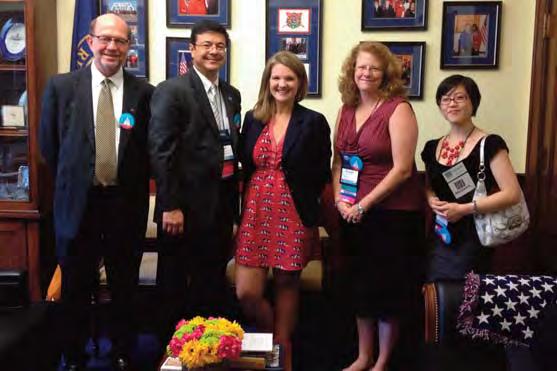
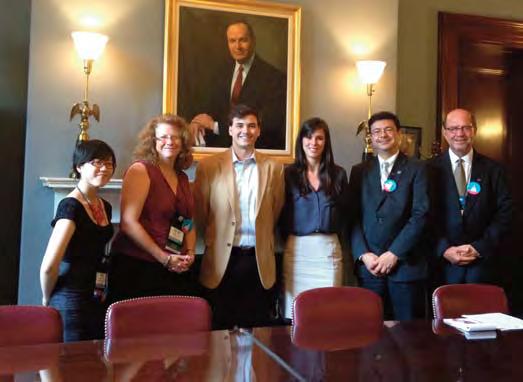
When we finished our meetings, I was convinced that our Association needs a day to promote the importance of music education with members of the Alabama Legislature. As President, I will work with President-elect, Susan Smith, and the Governing Board to host our state’s first Alabama Music Education Advocacy Day in 2016. Experienced Alabama educators will be relieved to see that we are taking on this challenge. I know this has been the dream of many members of our Association for a long time.
III. Enhancing Communications
Twitter Feed (@ALMusicEd). As your President, I will work aggressively to help the AMEA distribute news and resources more quickly using social media technologies. Our Association now uses Twitter to supplement our communications using Facebook and email. I encourage you to “like” our Facebook page and follow our Twitter account.
Website Retrofit.

Garry Taylor and I met to discuss revisions to the AMEA website to integrate modern and traditional methods of website deployment while incorporating feeds from our Facebook and Twitter accounts. We are exploring several options and hope to launch a new site before the January 2015 conference.


President’s In-State Travel. As President, I plan to enhance communications between the Governing Board and our various divisions by attending meetings and events sponsored by our divisions. Together, Susan Smith and I plan to attend meetings of all of our organizations during the school year.
IV. Elevating Efficiency
Strategic Planning. Several of our strategic goals are now over ten years old. To clarify the goals of our Association, Past President, Sara Womack, and a select committee revised our Strategic Plan, and we will publish the new plan so that all members of the AMEA will know the long-term direction of our Association.
Governance Structure
Revisions. At the June AMEA Governing Board Meeting, the Board passed a major revision to our organizational committee structure by consolidating the efforts
of multiple committees and creating a new Music Education Advocacy Committee with the authority to organize our Music Education Advocacy Day at the Capitol campaign. This revision should allow the Governing Board to operate more nimbly and refocus the AMEA on advocacy and professional development.
Conclusion
In 2005, AMEA President Becky Rodgers (now Warren) shared a story about how while staring at the enormity of the heavens and watching millions of stars twinkle in the night sky, she was overwhelmed with the feeling of being small and insignificant, until she remembered how important she was to her students and fellow music educators. Becky wrote, “What we do matters because music connects all humanity to each other and to that power that is greater than all of us” (Rodgers, 2005, p. 2). As music teachers, we are connected through our common interest in working with children, making music, and teaching. As a member of the AMEA, you are connected to a national organization focused on advocating music education on Capitol Hill and in your classroom. Attending the 2014 National Leadership Assembly in June affirmed my impressions.
Thank you for taking the time to learn about the direction of our Association. Please send an email to me with suggestions, feedback, and ideas (carlbhancock@gmail.com). I hope you and your students have a wonderful school year! - Carl
Rodgers, B. (2005, August). Insignificant? I hardly think so. Ala Breve, 2.
 AMEA Collegiate Representative Mai Yamane, President-Elect Susan Smith, Jay Dunn & Morgan Carter (Legislative Assistants to Senator Richard Shelby) AMEA President Carl Hancock and Executive Director Garry Taylor
AMEA Collegiate Representative Mai Yamane, President-Elect Susan Smith, Jay Dunn & Morgan Carter (Legislative Assistants to Senator Richard Shelby) AMEA President Carl Hancock and Executive Director Garry Taylor
ala breve 7
AMEA Executive Director Garry Taylor, President Carl Hancock Hillary Beard (Legislative Assistant to Congresswoman Terri Sewell), President-Elect Susan Smith, and Collegiate Representative Mai Yamane
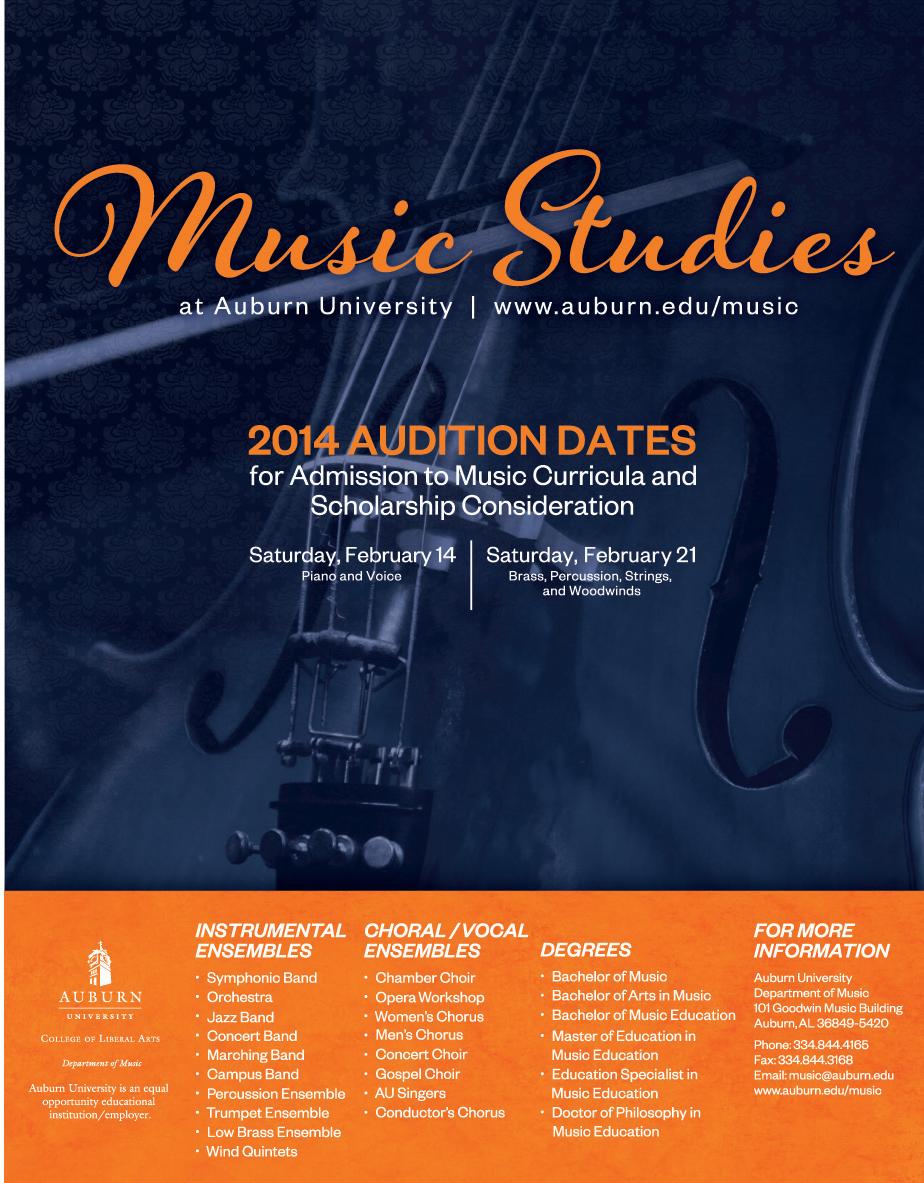
Greetings Collegiate Members,





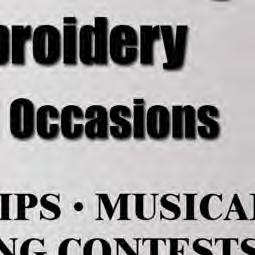




I hope you all are having a fantastic summer! Hopefully you all have had or will have opportunities in which you are engaging in ways to become better.
As for the Collegiate Board, we have been working hard preparing events for the upcoming school year! As AMEA is one of our biggest event of the year, we have chosen ten sessions and clinics in which all of you will engage in. Hopefully we have made decisions in which YOU will benefit the most. Please make plans to attend the AMEA Conference in January! Most schools provide funding for events such as this. I encourage all of you to seek out funds that are available especially for you. AMEA will provide you with valuable information that is instrumental in your future careers.
Besides AMEA we have another big event - the annual Fall Summit. This event is




always a fun and educational time! This event is scheduled for Saturday, October 11th, 2014 at the University of Montevallo from 1-5pm. We will have many sessions ranging from properly educating special education students, conducting crossover workshops and much, much more.


Lastly, I would just like to speak on communication. I would like every member to join our Facebook page –Alabama NAfME- Collegiate. This page is filled with important information and is updated regularly. As always, if you have any questions please contact me.
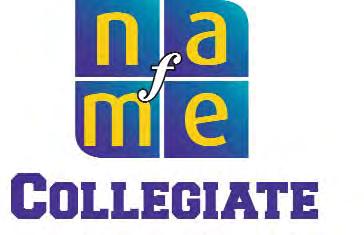

Thank you and I look forward to working with you this year!
Stacy Daniels President – Collegiate Division University of Montevallo
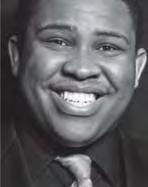
sdaniel4@forum.montevallo.edu (205)-215-8768

ala breve 9
Stacy Daniels - President, AMEA Collegiate Division
James Zingara - President,

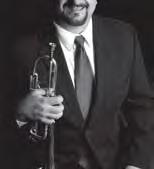
I am honored to serve as the incoming President of the Higher Education Division of AMEA. I would like to take this opportunity to thank past-president Lori Ardovino for her leadership and welcome Mildred Lanier from Jefferson State Community College as our new HED Secretary/Treasurer.
Our AMEA Conference offers a rich variety of sessions, clinics and performances that reach out to a broad spectrum of educators at all academic levels. As with previous conferences, the 2015 AMEA Conference will feature many HED sessions that will overlap into other interest areas including Band, Orchestra, Vocal, Collegiate and Elementary/General Divisions. In addition to these sessions, we would also like to offer activities that are endemic to higher education; the goal here is to attract new colleagues and their students to Nafme and AMEA membership and participation through expanded conference activities and performance opportunities.
Higher Education Division
To this end, we are adding some new events to the 2015 AMEA Conference. Common to all HED faculty members are concerns regarding tenure, promotion, overloads, salary, assignments, and other factors that impact HED educators. This year we will offer a panel discussion consisting of department chairs from around the state to discuss these as well as other topics. It is my pleasure to announce that we have a fantastic panel assembled which includes Dr. Sara Lynn Baird (Auburn University), Dr. Kathryn Fouse (Samford University), Dr. Alan Goldspiel (University of Montevallo) and Dr. Charles “Skip” Snead (University of Alabama). I would like to ask that the HED membership submit the questions and discussion points; you can send these inquiries to our HED e-mail: ameahed@gmail.com. I hope in future years to expand the panel discussion to other areas of HED.
The second new idea is to address some of the needs of our applied instructors. Our band, choral and orchestral colleagues have the opportunity to have their groups perform at the AMEA Conference. This is a noteworthy accomplishment and provides obvious benefits to the students,
their respective school and the attending audience. In the higher education world, many times applied teachers have smaller chamber ensembles that have logged many hours of rehearsal and performance that I believe should have the opportunity to be showcased at the state conference. With this in mind, for this year’s conference, we will convert the previous HED Faculty Recital into a University Ensemble Showcase. The idea here is to make the opportunity to perform at the state conference a noteworthy and prestigious endeavor. If you would like to have your group perform, please send an e-mail including your proposed program information (title, composer/arranger and movement titles) and personnel list to ameahed@gmail.com by November 1st, 2014.
I am greatly looking forward to the many opportunities to meet and work with new HED colleagues from around the state. Please do not hesitate to write me if you have any questions or ideas concerning the future activities of the Higher Ed Division. In the meantime, please accept my best wishes for a rewarding and successful school year!
2015 AMEA In-Service Conference Quick Facts


(The October issue of Ala Breve will provide complete details of the conference, including the schedule, performing groups, clinicians, etc. This quick guide is provided in advance for your convenience.)
Dates: January 22-24, 2015
Location: Renaissance Montgomery Hotel and Convention Center
Lobby Performance Applications are due by October 1. See the AMEA website for the form.
FAME applications are due by January 9. See the AMEA website for the form.
Pre-Register on-line (www.alabamamea.org)
Or, print and mail the pre-registration form on page 36 of this issue. Reserve a room at the conference rate:
Click on the link on the main page of the AMEA website.
Or, call toll free: 800-266-9432
Check back often for conference updates at www.alabamamea.org/conference
10 August/September 2014
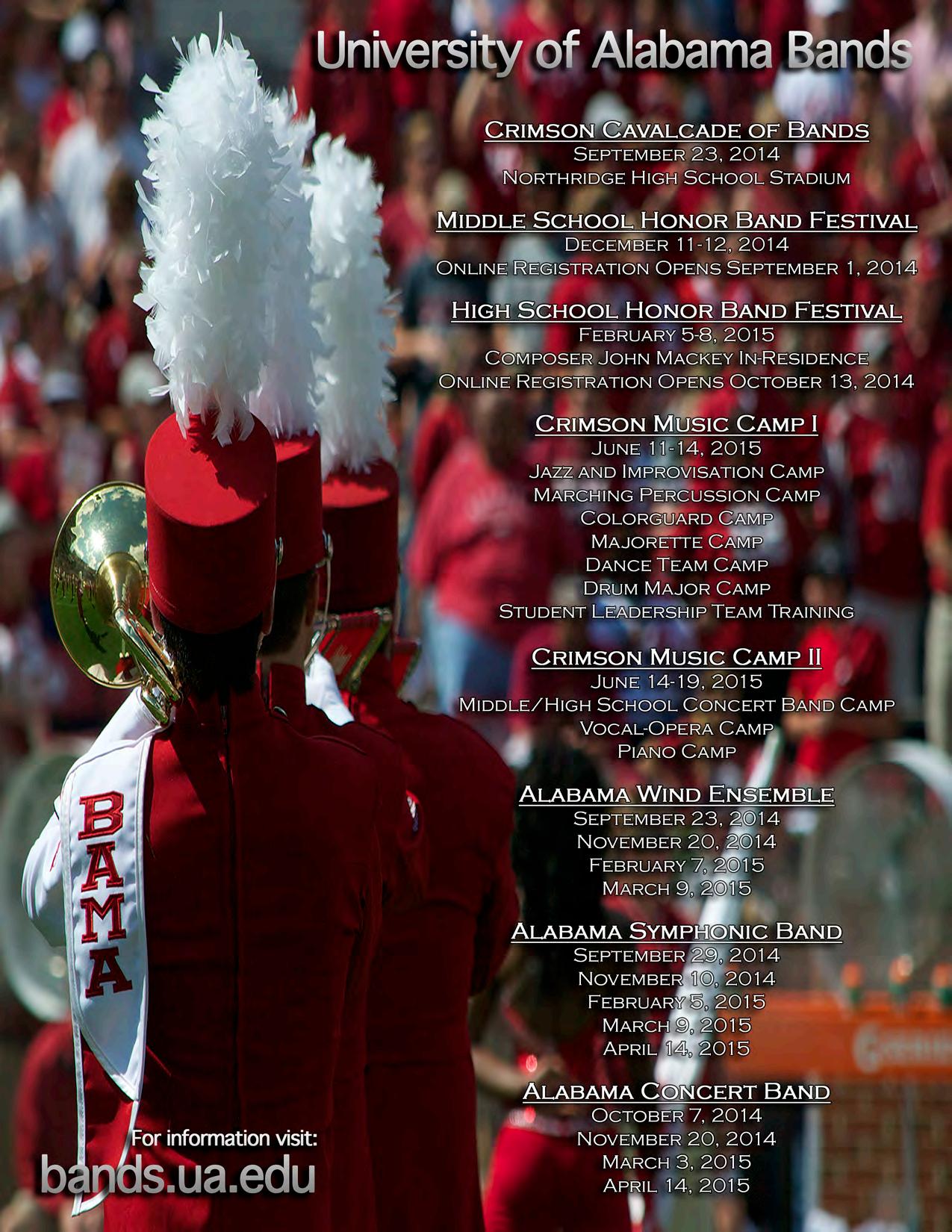
Each Member of the Jaguar Marching Band receives a scholarship


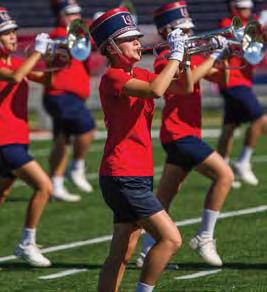
Full-Band travel opportunities to away games and exhibitions




Matching university-provided wind instruments


New custom drumline for 2014 Season
Newcustomdrum
One Pre-Game Show and Three Half-Time Themes each season

Fastest








AUDITION DATES
COLOR


JAGUAR
5751
251-460-6136
usajmb@southalabama.edu



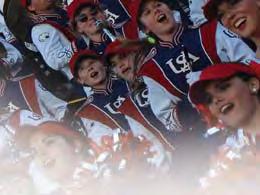

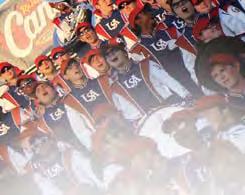

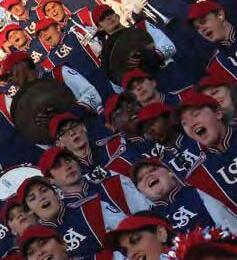



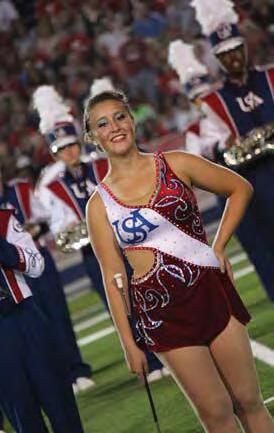
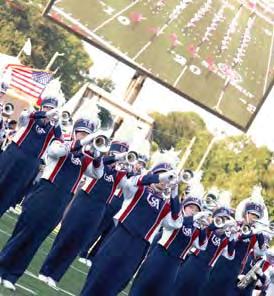

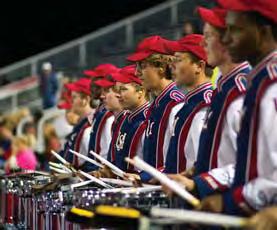
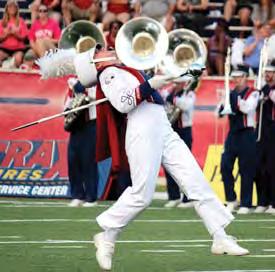

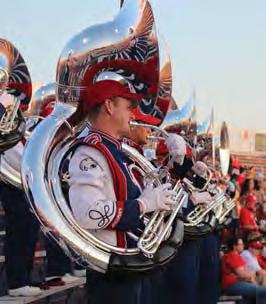
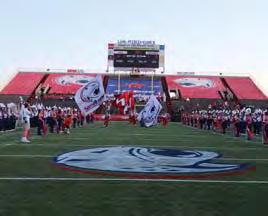
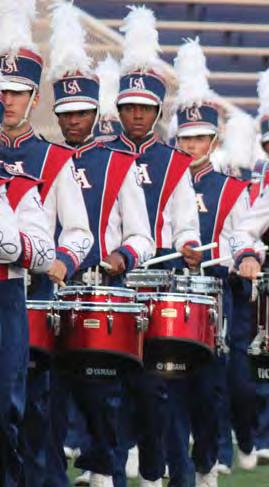
twitter.com/usajmb
www.jaguarmarchingband.org facebook.com/jaguarmarchingband
NO
fundraising
growing university in the state and region
fees and NO
November 8, 2014 March 14,
14, 2015 April 4, 2015
WIND
2015 February
GUARD June 27, 2015
July 9-11, 2015
DRUMLINE
MARCHING
UNIVERSITY OF SOUTH ALABAMA Laidlaw Performing
BAND
Arts Center
USA
South,
Mobile, AL
Drive
Room 1072
36688
For more Information about AUDITION DATES visit www.jaguarmarchingband.org or call 251-460-6136
universi
ty-provided
instruments Fb Nov WIND NO fees and NO fu u Sho custom drum A b142015 Ma ember 2014 undraising niversity re w and The mline il42015 arch 2015 gion mes each season 5751USADriveSout A OUT SO F ERSITY TY UNIV B July DRUMLINE Jun COLOR GUARD hRoom1072 rts Center TH AND 9-11, 2015 e 2015 p ruary 2015 www AUD m ril 2015 jaguarmarchingband.org or ITION ore facebook.com/jagu www.jag usajmb@southalaba AL 36688 5751 USA Drive Sout w armarchingband t uarmarchingba ma.edu h, Room 1072 itter.com/usajmb and.org
mlinefor2014Season
wind
Beginning, Middle, End.
The concept embodies most we do in life. Our profession is characterized by it. I love cyclical nature of our school year. I am grateful for the opportunity to begin, not only a new school year, but a final segment of my career as your Alabama Vocal Association President
Arnold Bennett said, “Any change, even a change for the better, is always accompanied by drawbacks and discomforts”. However, what century is this? I have not visited a bank to deposit a check in over a year, choosing rather to use my smartphone to deposit checks from home. One of my goals, as your new AVA President, is to move our organization forward in its use of welldeveloped technologies that facilitate our current organizational behaviors--record keeping, registering for events, disseminating information and interacting with our membership. We should be suspicious of always having to determine what others are doing to chart our own course, yet we need not reinvent the wheel. I anticipate that these next two years will be characterized by testing.
Communicating with and within our organization is an essential. Maintaining a current up-to-date database of our membership facilitates our ability to communicate. In the past, your district chairman, during the month of May, attempted, with varying success, to update our district by district mailing lists. This method served us well in the paper and United State Postal Service era. Currently, however, it allows our AVA board to communicate with the membership only thru each individual district chairman. Again, what century is this? This year, we ask you to visit the AVA website and complete the following steps: 1. Visit www.AlaVocal.org. 2. Click the “Director Portal” 3. Enter the Case Sensitive Username and Password (all lower case) Username: pat Password: blackwell 4. Under the “Membership” Heading, Click the “Member Registration” button. 5. Enter your data.
6. Provide feedback to the AVA board concerning your experience. Was it simple, trouble free? Did you experience any difficulty entering or submitting your information? We hope that this will be the method going forward in which we collect and maintain a current up-to-date database. In the future, we will require a yearly submission by the membership database information before allowing participation in any AVA event. This endeavor should yield our organization a current year-to-year reliable database of information. However, this year is a year of practice and testing. Please enter your database information and provide us with feedback.
Registering for events is essential to the functioning of our organization. A revised AVA Handbook with all current registration forms is now available on the AVA website. This year, only forms printed from the website can be used to register for events. This year, register for all events just as you have in the past. However, again I ask, “what century is this”? With our current method of registering for events, our executive secretary is required to hand type some 3,000 names from typed and handwritten registration submissions, just for all state auditions alone. We have decided to invest in Adobe FormsCentral as a possible tool for collection of event registration information. We have found the forms we already use on the website to be compatible with this system. Again, we ask that you register for all events as you have in the past. However the new forms on the website offer us added functionality. Possibly you will see a “submit” button at the bottom of the forms on the website. When clicking “submit” on an AVA form, a database entry is automatically created that can be made available to the AVA board at a moment’s notice. This year, we ask that you register for all events as normal. However, if you see a submit button on the form that you are completing, try
clicking it at the completion of typing in your information. Clicking the submit button will only provide the AVA board needed information to decide if this is a method we wish to use going forward. It will not register you for an event.


As our organization progresses in the use of currently available technology, I hope you are willing to explore and test a variety of methods for our collecting of and presenting information. There will be more information concerning this presented at the Fall Workshop.

The 2014 AVA Fall Workshop will be held on the campus of the University of Alabama on Friday, September 5th. This year the fall workshop is a one day event. Rollo Dilworth will present four sessions which will address issues of effective warmups, artistry in performance and present more than twenty-three pieces throughout his four sessions. These twenty-three titles will be bound in octavo size and are included as part of your registration cost. We will also have 2-30 minute mini-sessions. These sessions will address: Sight-reading From the Adjudicator’s Prospective (Shirley Ellison) ; Tips and Guidelines for the Changing Voice (Dr. Phillip Stockton) ; Sex Differences in the Choral Rehearsal (Dr. Megan Rudolph); To Go or Not to Go—Why Directors participate in AVA Events or not (Khristi Motley). If you have taught 1 – 3 years, please register for the free New Teacher Luncheon. Hilen Powell and Dr. Rollo Dilworth will present some relevant information at that luncheon.
Remember to join or renew your NAfME membership before the fall workshop. I wish you all the best as you begin your new school year.
ala breve 13
Carl Davis- President, Alabama Vocal Association
I hope your summer left you well rested and full of inspirational ideas for the new school year. As we begin a new year in our private studios and classrooms, may we remember this quote:
“Every person is important. It doesn’t matter whether you play the violin, the flute, the cello or the drums, you’re still part of the orchestra.” ~unknown
When students enter your classroom or studio for the first time this year, remember that everyone is different and important. Your teaching style is unique to you and also unique to each individual student. All of your tricks (exercises) will not work with every student. You have to find what works for each student and help them grow as a musician in their own way. Remember to work with all of your musicians, not just the one who learns fast or the ones that need lots of help. As teachers our goal should be to get ALL students to work to their fullest potential. When everyone works to their fullest your group will accomplish amazing things.
I thank you for giving me the opportunity to lead AOA this year. I am excited for what the year will bring and the great music we will be making around the state. I would like to welcome our new faces to our AOA leadership team: Samuel Nordlund is our new Vice President/President-Elect and Eliza Warden is a new Central District chair.
One of the main events AOA organizes is the Alabama All State Orchestra Festival. This will be held at the University of Alabama in Tuscaloosa on February 12-15, 2015. I am excited to announce the conductors and music each orchestra will perform this year.
The Festival Orchestra will be conducted by Daniel Black (Assistant Conductor of the Fort Worth Symphony Orchestra). They will be performing Tchaikovsky’s Fifth Symphony, 4th movement, Borodin’s Prince Igor Overture, and the composition contest winner’s song.
Sinfonia will be led by Dr. Robert Gardner (Penn State University). They will be performing Bizet’s L’Arlesienne Suite No. 1, movements 1-3 and Suite No. 2, movement 4; and Symphonic Poem - an original composition by their conductor Dr. Gardner. We will be looking for 4 percussionists, a saxophonist, and harpist for this group along with all the other standard orchestral instruments.
Dr. James Mick (Ithaca College), will conduct the Consort String Orchestra. They will perform An English Folksong arranged by Terry McQuilkin, Toccatina by William Hofeldt, For the Star of

County Down Arranged by Deborah Baker Monday, Appalachian Sunrise by Doris Gazda, Spartacus by Brian Balmages, and M to the 3rd Power by Carold Nunez.
Please encourage your string, wind, brass, and percussion students to audition for this year’s festival. This will be our third year where the top two orchestras are full orchestras. Both orchestras will be performing non-arranged music. This steps up the level of the wind and brass musicians needed, and hopefully makes it an educational and growing experience for all. We were blessed last year with amazing brass and wind musicians. I hope we will get an even greater response this year. Audition excerpts will be posted on our website on August 11, 2014:
http://www.alabamaorchestraassociation.org


String teachers, after your students finish their auditions for the All State Orchestra in early October, encourage them to attend the ASTA Alabama Honor’s Orchestra Festival held at the University of Alabama, November 7-9, 2014. For more information on the Honor’s Festival go to www.astabama.org
If you have a student who yearns to be a part of a youth orchestra year round here are a few they should check out. The Alabama Youth Symphony Orchestra (AYSO) new conductor, Dr. Blake Richardson is looking to increase their numbers this coming year. This is a high performing youth orchestra based in Birmingham. Audition registration deadline is August 25. http://www.alabamasymphony.org/asyo.htm
The Mobile Youth Symphonywww.mobilesymphony.org/youth-orchestra
Huntsville Youth Symphony- www.huntsvilleyouthorchestra.org
Etowah Youth Orchestra- www.culturalarts.org
Montgomery Youth Symphony- www.montgomerysymphony.org

Baldwin County Youth Orchestra- www.bcyorchestra.com
Tuscaloosa Youth Symphony- www.music.ua.edu/communitymusic-school/tuscaloosa-youth-orchestra
Tiger Strings Youth Orchestra (Auburn)- contact Dr. Kathy Kingkingkat@auburn.edu
If your orchestra was left off of this list and you would like it to be included, please send me the contact info, so I can post on our website. Feel free to contact me with any questions about AOA or information on how to become more involved. Burkart_Sarah@yahoo.com
Remember, every student is important! May you all have a productive and inspiring school year!
14 August/September 2014
Calendar of events: All State Audition excerpts posted online.............................................................August 11, 2014 All State Audition Registration Deadline........................................................September 30, 2014 Composition Contest Deadline..............................................................................October 1, 2014 All State Results Posted online........................................................................November 17, 2014 All-State Scholarship Application Deadline.......................................................December 1, 2014 All-State Festival...........................................................................................February 12-15, 2015
Sarah Schrader - President, Alabama Orchestra Association
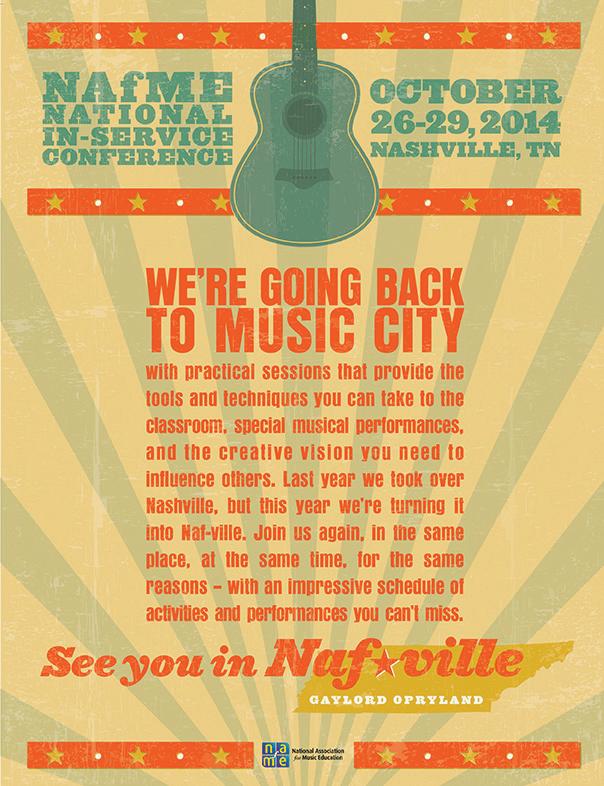
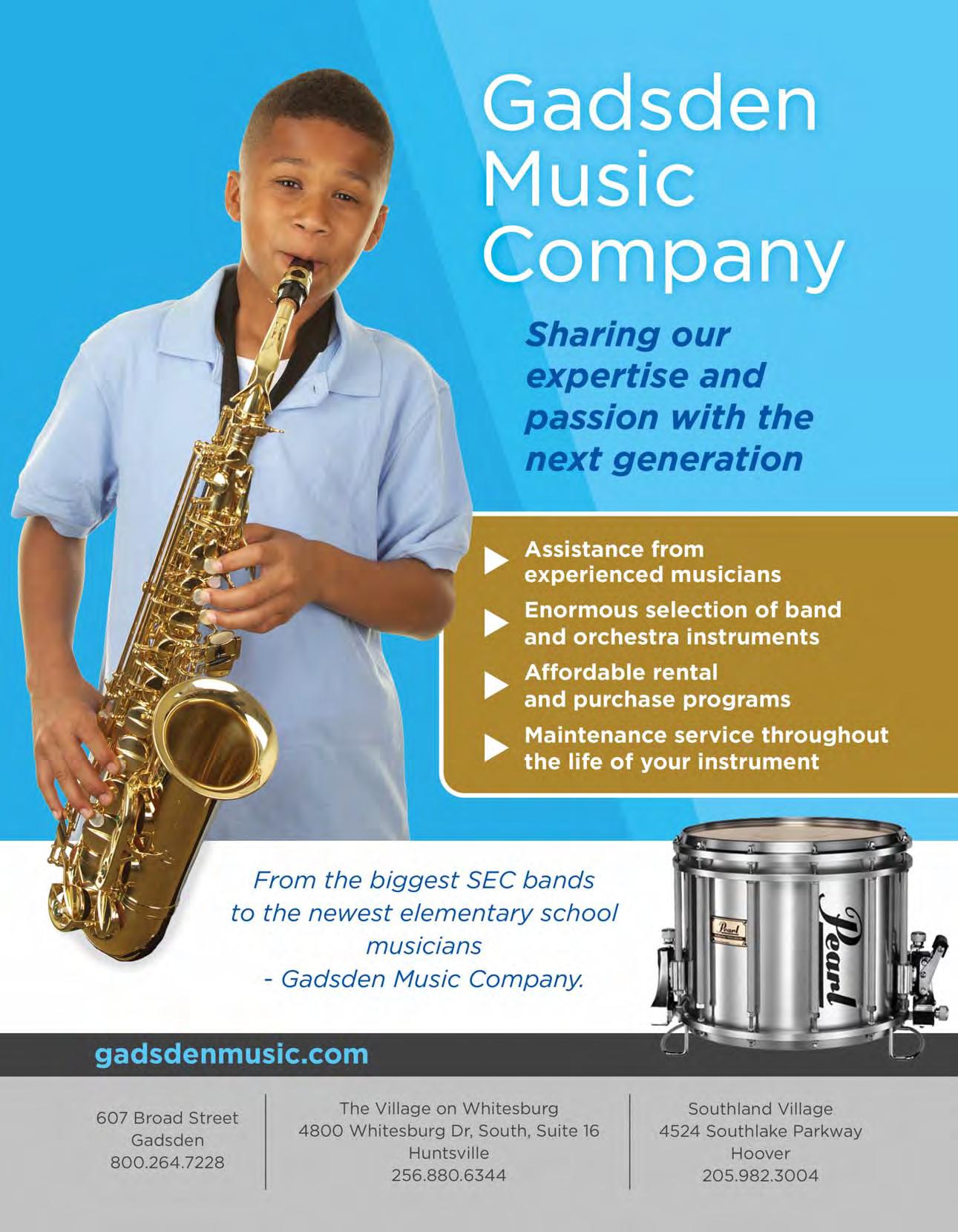
Well, at this point, summer is over for most of us. Hopefully, you were able to rest and relax a little. As I write this, I’m trying to wrap up last minute preparations for band camp, as many of you are doing as well. Others are completing their first week of camp this week. Hopefully everyone will have a great summer and fall!!!
some growing pains, but if the transition is as smooth as we had with MPA last year, I think that we’ll all be pleased with the results. We all owe our liaison to DBS, David Raney, a huge debt of gratitude for his hard work on this project. Like many of you, I enjoy the advantages of technology, but I couldn’t begin to understand how to write code!!! David is one of us, yet understands and embraces that process as well, and we’re very fortunate to have him working alongside the programmers at DBS!!!
hurricane (I forget which one), the shrimp boil went away. Thanks to the determination of the sponsors mentioned above, the shrimp boil is back and from what I’ve been told…is here to stay! Please let these vendors know how much we appreciate their efforts, and if you were unable to be there, make plans to be there next year. I can assure you that it will be worth your time .
As we move forward into the 2014-15 school year, our new website associated with the relationship that we established with Dorian Business Systems is up and running. If you haven’t already, please go in and register on the website TODAY!!! If you’ve moved to a new school, please go in and UPDATE your registration to reflect the move. This is especially important, as you need to be registered HERE in order to receive emails and updates from any of the board members (from myself all the way through your district chairs). One of the advantages of ABAFest is the ability to send an email to everyone in the state or a specific district with one click…something that we’ve never been able to do before. Simply go to www.abafest.com, click on the registration link, type in all of the requested information, and you’re done!




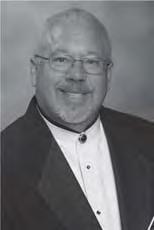
We expect the following features to be in place on ABAFest this school year: Our cumulative list (which will be searchable), and completion of the MPA component. Many of us used the website to register for MPA last year but the entire module should be completed prior to MPA next winter/spring. Most of us will use Audition Manager for all-state auditions one more time, but we expect that at least one district will beta test the DBS version next year...much like we did when transitioning from paper/pencil to Audition Manager some time ago. There will definitely be
Hopefully you were able to attend our Summer Convention in Orange Beach earlier this summer at the Hampton Inn and Suites. We will be back in that location next year as well. We had outstanding clinics presented by Elva Kay Lance, Randall Coleman, Ken Ozzello, and David Allinder. PRACTICAL professional development is always important, and we thank each of you for sharing with us!
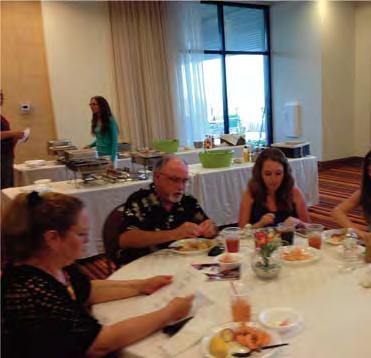

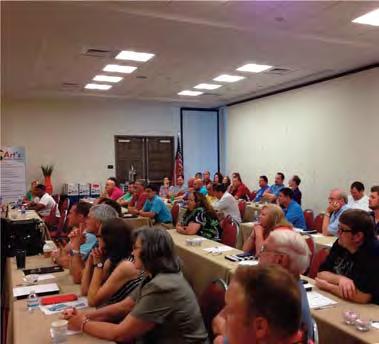

A special thanks to Wayne Broom (AWB Apparel), Art’s Music (Paul Frehling), Frank Godfrey and Jeff Thurber (DeMoulin Band Uniforms), Roland Mouchette (Mouchette Enterprises), and Chester Bean (Sound Choices) for sponsoring our social gathering on Wednesday evening. For the first time in many years, we enjoyed a traditional shrimp boil meal!!! Some of you may remember that in the early days of summer convention, we would have a shrimp boil on the pavilion at the state park. After the pavilion was destroyed by a
I’m doing a little self-plagiarizing (yes, it IS a real thing lol), here, but I would like to welcome our new directors to the profession. I’d also like to remind those of you that have been at this for awhile to reach out to the new directors as well (and new directors, be RECEPTIVE TO THE OFFER!!!). I keep asking myself “When did you become the OLD guy!!!” I honestly can’t remember…it just happened at some point as directors older than me retired. The bottom line (let the selfplagiarizing begin) is that we should all treat directors and those associated with their programs (parents, students, etc.) with respect and admiration. SO MANY of the world’s problems could be solved if we would simply treat people right. Keep that in mind as you progress through the school year. Everything in boldface comes directly from my article last August. I don’t think I could have said it any better, and it’s so true that it bears stating again. I’ve asked my kids for years to “…do the right thing, because it’s the right thing to do.” I must admit that I’ve been guilty of straying from that mantra, but I could state so many names of folks in our profession that have kept me on the straight and narrow during the 25+ years I’ve been doing this. In closing, try to treat people right, remember that we do what we do for our kids, be willing to reach out to help those that need help, and be willing to ask for help when you need help (the hardest one of the group for me). If you do those things this school year, I know that you’ll have a GREAT year!!!

ala breve 17
Rusty Courson - President, Alabama Bandmasters Association
Mentors - Part II
This is the second installment of interviews asking veteran band directors to describe their “first mentor” in the profession. Everyone has one of these stories, and they are always interesting and sometimes surprising! I hope you will enjoy what follows.

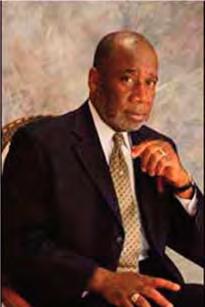
Tips That Click


band director I had that actually was trained in music and that was one thing that set him apart from the others. He took a special interest in us and took groups of us to concerts in the region so we could experience top rate performances. He continued to keep up with me when I went to study at Clark University in Atlanta and when I took my first job at Calvary Hill Junior High in Huntsville. His advice was very valuable as I prepared my group to perform at the State Competition at Alabama A&M. We got a Superior Rating that year, and I was so inexperience that I did not know what that meant! Mr. Watson continued to teach in various schools in Gadsden and retired after forty years of service. His nurturing certainly meant a lot to me in my formative years as a musician and teacher.
Mr. William T. Robinson is a member of the Alabama Bandmaster Hall of Fame, and produced outstanding bands for many years in the Huntsville area. He also served as in leadership roles for Phi Beta Mu and the Alabama Bandmasters Association during a career of over 30 years. He currently is a private lesson teacher in his retirement with his private students consistently selected for membership in the Alabama All-State Bands. He shared a very interesting story with me about his mentor. “My first mentor was Harold Watson, who was one of my band directors at Carver High School in Gadsden in the mid 1950’s. He came to us my Sophomore year and left after the first semester to fulfill a military commitment. He returned to us my Senior year and the band was very happy that he returned. During those years we were used to beginning with a new band director every September. Things were very different then; the directors we had were not formally trained music teachers, just whoever the principal could find with band experience. Mr. Watson was the first
Mrs. Deborah Basinger retired after 37 years of service to the band students of northwest Alabama, mostly in the Florence City Schools. After graduating from the University of Mississippi, she taught one year as an itinerant music teacher in Lawrence County, Tennessee -providing instructing for every student in five different elementary schools. She began looking for a job in a position that would require less travel and found one at Phillips High School in Bear Creek, Alabama -- the week of the first football game! During this year, she found a
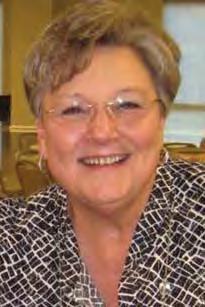
mentor in Rodney Dasinger. “To say I was “green” that first year of band directing would be an understatement. Rodney was teaching at Guin High School in Marion County and was widely respected for developing a fine program in a small community. I was blessed that he took an interest in us younger directors. He was always so positive and full of good advice. Of particular help to me was how he encouraged me to have my group participate in the Alabama Bandmasters Association events. I was pretty intimidated by this as I was teaching at one of the tiniest high schools in the state, with less than stellar instrumentation. But Rodney was right, and I learned a lot from preparing and taking my group in that first year. I stayed at Phillips for two more years and Rodney Dasinger was always a source of experienced information.” After leaving Guin, Dasinger went to Hartselle and then to Rutherford High School in Panama City, Florida where he taught for 29 more years.
As we begin this year, I encourage all experienced teachers, active and retired, to reach out to the new teachers we have in the profession or those coming to new positions. Your listening and processing skills are needed desperately as we insure that there is a supply of candidates to lead stable programs in the future. You can make a real difference just by “checking in” or showing up for an occasional visit and word of support. The membership of Rho Chapter of Phi Beta Mu wishes everyone a successful and fun year of making and teaching music!
Rho Chapter of Phi Beta Mu International Bandmaster Fraternity is committed to improving bands and band instruction in the state of Alabama. Have an idea for a future article or interview? Email: pemin@mac.com

18 August/September 2014
Phi Beta Mu
UNCONVENTIONAL WISDOM

Unorthodox. Unexpected. Unusual. Rather than follow the path of least resistance, creativity is about asking, questioning and discovering new paths to insight. It thrives in an environment that encourages individuality over conformity, and self-discovery through community. Discover unconventional wisdom at the University of Montevallo Department of Music, an All-Steinway School offering Bachelor of Music degrees in Music Education & Performance and the Bachelor of Arts degree in Music.
SCHOLARHIP AUDITION DATES:



























2.7.152.28.153.14.15







To schedule an audition, complete the online form found at: www.montevallo.edu/music/auditions

To schedule a visit or for more information contact: 205-665-6670 or music@montevallo.edu
www.montevallo.edu/music

Karla Hodges - President, Elementary/General Division
Here We Go Again…

Another summer break has come and gone and now we look ahead with excitement to begin another great school year. Hopefully you found time to rest, relax, and reflect on this past school year and what you can do to make this year your best year yet. One way to make this year great is to be involved in your professional organizations. We have some wonderful professional development opportunities lined up for you this year and I hope you will make plans to attend them all.
First, is our Elementary Music Festival on Friday, October 3. This year we have almost 450 students participating. Due to the increase in number of schools participating we will, for the first time,
1946Yale H. Ellis
have two performing choirs. Our featured clinicians for the choirs are Dr. Michele Champion from Mississippi but recently moved to Georgia, and Birmingham native, Mr. Ken Berg. I encourage you to attend the evening concert at Samford University Wright Center at 6:30 PM. The following day, October 4, we will hold our AMEA/ AOSA Joint Fall Workshop. Dr. Champion and Mr. Berg will be our clinicians for the day. Please join us from 9 AM-3 PM at Gwin Elementary School in Hoover, AL.
Two wonderful conferences are being held in Nashville, TN this fall. October 26-29 is the NAfME National In-Service Conference at the Opryland Resort and Convention Center. The 2014 AOSA Professional Development Conference will be held November 5-8 at the Renaissance Nashville Hotel and Convention Center. If you’ve never had an opportunity to attend one of these conferences I encourage you to attend one this year. I promise you will not regret it!
We are already making preparations for our 2015 AMEA In-service Conference in Montgomery, AL. The conference will be held January 22-24 at the Montgomery Renaissance Hotel and Spa at the Convention Center. This year’s conference has something for everyone! We will have sessions focusing on the child’s singing voice, the elementary chorus, folk music, blending Orff and Kodaly, understanding the new national arts standards, and much more. You will hear more about this conference at our fall workshop. Pre-registration for the conference opens August 1 on the AMEA website, alabamamea.org. I hope to see you there!
I wish you a wonderful 2014-2015 school year. I hope it is your best year yet and I look forward to hearing about it when I see you at the Fall Workshop on Saturday, October 4!
Until Then, Karla Hodges
AMEA Elementary/ General Division, President

AMEA Presidents - Past to Present
1970Jerry Bobo
1992Dianne Johnson
1948Walter A. Mason
1950Vernon Skoog
1952John J. Hoover
1954Lamar Triplett
1956Carleton K. Butler
1958Mort Glosser
1960Wilbur Hinton
1962Lacey Powell, Jr.
1964G. Truman Welch
1966Jerry Countryman
1968Floyd C. McClure
1972Frances P. Moss
1974George Hammett
1975Frances P. Moss
1976S. J. Allen
1978W. Frank McArthur, Jr.
1980Paul Hall
1982Lacey Powell, Jr.
1984Johnny Jacobs
1986Merilyn Jones
1988Ronald D. Hooten
1990Ken Williams
1994James K. Simpson
1996Johnnie Vinson
1998Michael Meeks
2000John McAphee, Jr.
2002Tony Pike
2004Becky Rodgers
2006John Baker
2008Pat Stegall
2010Steve McLendon
2012Sara Womack

20 August/September 2014
Artists believe in Yamaha.
“The Yamaha Silent Violin feels as natural as its traditional counterpart! It has a warm tone in the studio and it can cut through on stage with a live band despite its light weight. Over the years, Yamaha has been a compelling leader in its dedication and its contributions towards evolving the role of the violin in today's contemporary music. So whether you're playing hip hop, rock, jazz fusion, country, classical, reggae or whatever your favorite genre, this is the best sounding electric fiddle out there.”
–Karen Briggs Internationally Renowned Violinist


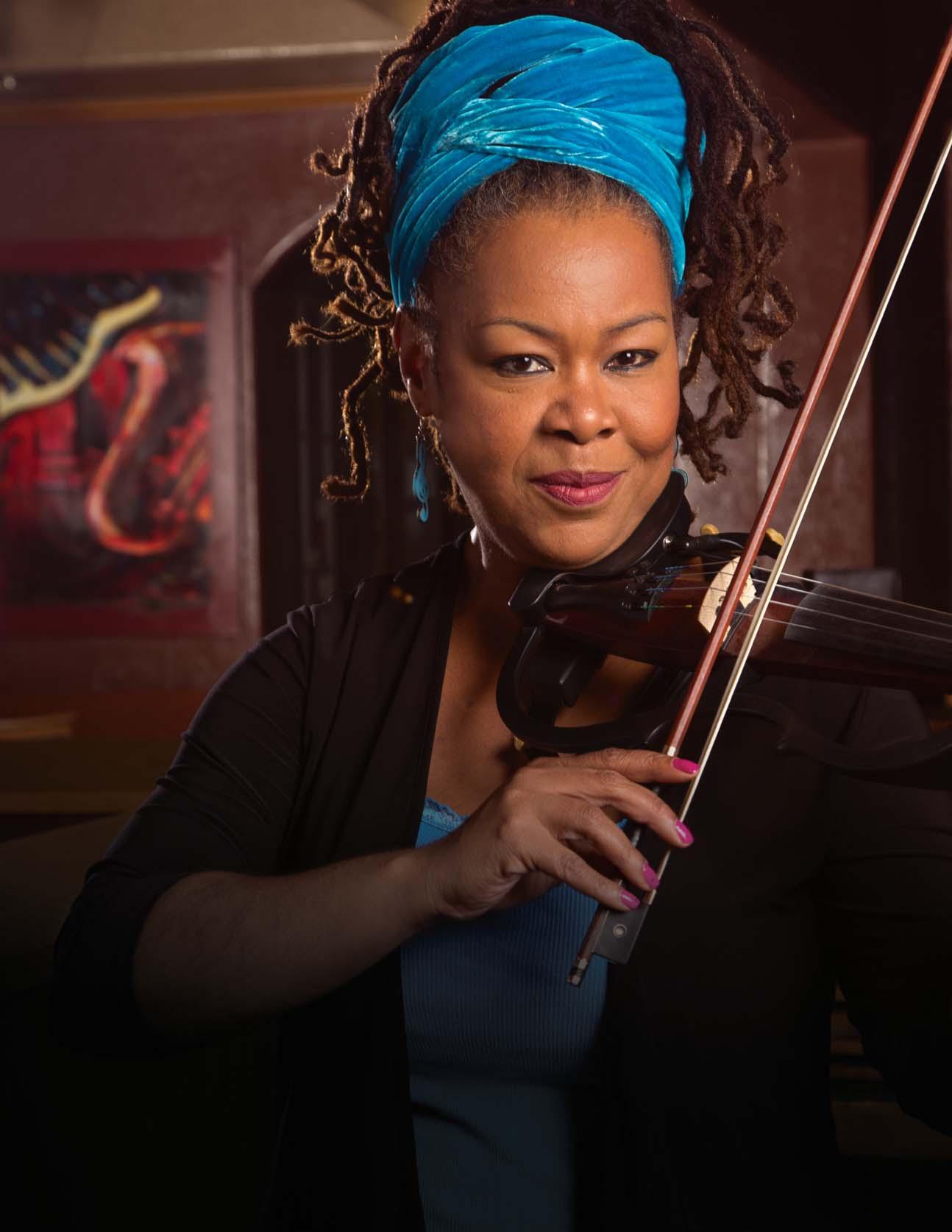
Campus Connections...
News and Happenings from Alabama’s Colleges and Universities
Colleges and universities are encouraged to submit newsworthy material and announcements for publication in Ala Breve
John M. Long School of Music Troy
University
As a new school year begins, we are grateful to AMEA for providing this opportunity to share information with our music colleagues and music students across the state.
New John M. Long Hall
John M. Long Hall, the newest part of the School of Music, was dedicated this past March on our Troy University campus. This new state-of-the-art facility serves as “home” to our university bands, university choirs, percussion, dance, and administrative areas in the School of Music.
Up-coming Annual Events:
Southeastern United States Middle School Band Clinic – Dec. 4-6, 2014.
Contact Dr. Mark Walker
Southeastern United States Choral Clinic
Jan. 16-17, 2015.
Contact Dr. Diane Orlofsky
Southeastern United States HS Honor Band/Conductors Clinic – Feb. 5-7, 2015.
Contact Dr. Carla Gallahan
Guitar Festival – Feb. 20, 2015.
Contact Dr. Robert Gibson
Clarinet Day – Mar. 28, 2015.
Contact Dr. Tim Phillips
MEETING MINUTES
AMEA Governing Board Meeting, June 12, 2014
Montgomery Renaissance Hotel, Montgomery, Alabama
The AMEA Governing Board met at the Renaissance Hotel in Montgomery, Alabama on June 12, 2014. The meeting was called to order at 10:04 a.m. by AMEA President Carl Hancock. Present at the meeting: Carl Hancock, Sara Womack, Susan Smith, Garry Taylor, Carla Gallahan, Rusty Courson, Mike Holmes, Sarah Schrader, Carl Davis, Pat Blackwell, Stacy Daniels, Thad Walker, Ciff Huckabee, Ted Hoffman, James Zingara, Harry McAfee, and Becky Lightfoot.
A motion was made to delay the reading of the minutes (Sara Womack, Ted Hoffman). Passed.
Garry Taylor presented and discussed the AMEA Financial Report.
The minutes of the January 22, 2014 meeting of the AMEA Governing Board were read by Recording Secretary, Carla Gallahan. A motion was made to approve the minutes as read (McAfee, Hancock). Passed.
The minutes of the January 24, 2014 meeting of the AMEA General Session were read by Recording Secretary, Carla Gallahan. A motion was made to approve the minutes as read (Courson, Smith). Passed.
The minutes of the January 25, 2014 meeting of the AMEA Governing Board were read by Recording Secretary, Carla Gallahan. A motion was made to approve the minutes as read (Hoffman, Womack). Passed.
Officer, Representatives, and Division Reports may be viewed online by visiting our website, www.alabamamea.org
Garry Taylor conducted Leadership Training for the AMEA Executive Board.
2014 American Bandmasters Association Convention
Troy University served as host for the 80th American Bandmasters Association Convention. The convention was held at the Renaissance Montgomery Hotel March 4-9, 2014. The Troy University Symphony Band performed as part of this convention. Additionally, Dr. Mark Walker, Troy University Director of Bands, was elected to membership in the American Bandmasters Association.
Additional information about the John M. Long School of Music may be found at music.troy.edu. We invite you to visit us online or in person soon.
New Business
The FAME Scholarship applications were distributed, reviewed, and voted upon.
A discussion occurred on reorganizing the AMEA Committees and involves a collapsing of structure and renaming of committees. Rationale for the reorganization: some of the committees no longer exist and some of the committees are duplicates. This reorganization aligns with the new strategic plan that will be voted on at the next meeting. A motion was made to accept the reorganization of the AMEA Committees (Gallahan, Hoffman). Passed.
Scheduling for the 2015 AMEA Conference was discussed.
Review of the Executive Director: the Board conducted this annual review and reported that Garry Taylor is doing an excellent job as AMEA Executive Director. He is professional, accessible, and has a very good relationship with all divisions.
Review of the Ala Breve Editor: the Board conducted this annual review and reported that Garry Taylor has done excellent work with the Ala Breve and is extremely organized.
The 2014-2015 AMEA General Budget was reviewed and discussed. A motion was made to accept the budget as amended. Passed.
A motion was made to increase the state level NAfME dues by $5.00. The motion failed.
A motion was made to increase the AMEA Conference registration for “active” members to $85.00 (pre-registration) and $100.00 (on-site registration) to take effect immediately (Gallahan, Smith). Passed.
The next meeting of the AMEA Governing Board will be held on Saturday, August 16, 2014, 10:00 a.m.
The AMEA Governing Board meeting was adjourned at 2:29 p.m.
Respectfully submitted, Dr. Carla Gallahan, AMEA Recording
Secretary
22 February/March 2014
An unexpected invitation...

 By Mai Yamane, CNAfME State Secretary for Alabama
By Mai Yamane, CNAfME State Secretary for Alabama
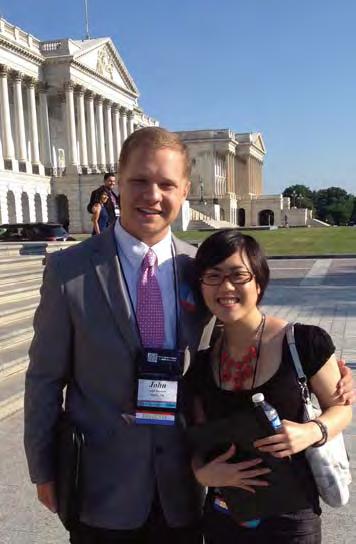
An unexpected invitation leads to an adventure in music education advocacy and a new view about the role of NAfME in the training of young music teachers. I was spending just another day working on my homework when I received an email from AMEA president, Dr. Carl Hancock, with an offer to represent the Alabama Music Educators Association at the NAfME Collegiate Advocacy Summit in Washington DC; I said yes without thinking twice. Two weeks later I was sitting in the offices of Senator Shelby, Senator Sessions, and Congresswoman Sewell (District 7) and discussing the importance of music education to the future of our country and the state of Alabama. What I experienced at the first Collegiate Advocacy Summit is something I will never forget…music education is not only worth fighting for, but requires non-stop advocacy. The college students I met had similar interests and concerns about our profession, and we were ready to let everyone know how music transforms the lives of students to the benefit of all.
Today, standardized tests are being used to measure students’ progress and learning in a handful of academic subjects and President Obama has articulated the importance of Science, Technology, Engineering, and Math (STEM) courses to the our national interests. However, there is a limit to what those classes and tests can provide. Leaders in the National Association for Music Education
believe the measure of a student lies beyond the bubbles found on standardized test forms––there are inherent benefits to participating in the Arts that today’s students and the our future prosperity as a nation need to be successful. Studies have shown that participation in music promotes higher achievement in academics, improves reading skills (Update: Applications of Research in Music Education, 2008), focuses student attention (Scientific American, 2010) and improves school graduation rates (Harris Interactive, 2006). Beyond academics, studies have shown that through music participation students learn to express their feelings more readily (Emotional Awareness), become more dedicated workers (Grit), and learn to communicate better with others (Collaboration and Communication). Despite the fact that many positives come out of music participation, these aspects of music are not tested on bubble tests, they are “Beyond the Bubbles.” When I arrived in DC, I was not aware of the Broader Minded campaign, “Think beyond the bubbles,” yet I was quickly inspired by it and fell in love with the fact that it does not forcefully place the importance of the arts above STEM, but instead seeks to promote broader thinking by incorporating the arts (STEAM). I highly enjoyed the training sessions and learned much about advocating for music education from Christopher Woodside and the staff of NAfME.
Another thing I learned was the importance of doing in-depth research prior to speaking with members of Congress. For example, a study by Harris Interactive in 2006 revealed that students’ attendance was higher at schools with music programs than schools without music programs. Helping legislators

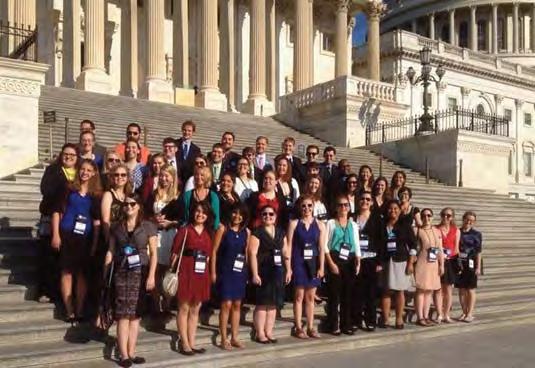


understand these extra-musical benefits is important to keeping music in schools. I also learned about the power of using a personal story involving music. In my experience as a person whose primary language is not English, I hated going to school and often cried because I struggled with communicating and relating to others. However, when I joined the band everything changed. I made many friends and found a place where I could succeed and belong. By the end of my high school years, I had served as an assistant band captain and drum major and had many friends I could count on. Music participation can have powerful personal benefits for students. I am a person who experienced this transformation and I know others who had experiences similar to mine.
Another thing I learned was to help legislators feel the argument personally. For example, Congresswoman Terri Sewell is known for being a strong advocate for education and a fan of musicals and operas. As such it was easy to establish a relationship with her legislative assistant through data and personal stories about music making and the importance of the arts. Making a connection was as important as
ala breve 23
NAfME Collegiates advocate for music education on capitol hill
NAfME Collegiates John Norman, Tennessee and Mai Yamane, Alabama

being knowledgeable about legislation. Also, I learned that advocates for music education should be actively involved in schools and familiar with education agendas and budgetary issues. I believe knowing this information, first hand, will improve discussions of new and ongoing policy directives with our representatives. I have learned so much about advocacy during this Summit and I am excited to be able to incorporate this knowledge in my training as a pre-service music teacher.
Attending the 2014 Collegiate Advocacy

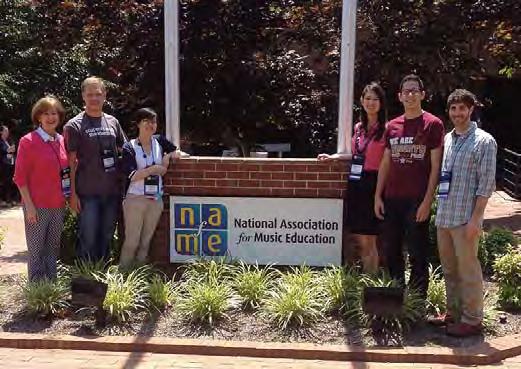
Summit changed my views of the role of NAfME in my profession career, the importance of advocacy to my future students, and my capabilities as a collegiate advocate. I first became a member of CNAfME several years ago in the hope of providing opportunities for my future students through participation in music festivals, all-state ensembles, and in-service conferences sponsored by my state association. However, the main focus of NAfME is much larger than I could imagine. NAfME is leading the charge to ensure that EVERY student has access to a quality music education program led by a state-certified teacher with our national leaders.
My friends, being a member of CNAfME has a new meaning for me. I need to become an inspiring teacher AND raise my voice as an advocate for music as a core academic


subject available for all preK-12 students. NAfME is the leading voice advocating for music education every day for every student. Seeing our national organization “in action” and “first hand” made me realize that I should be involved as well. I highly encourage my friends and colleagues to attend the National Collegiate Advocacy Summit in Washington, DC next year as well as the National NAfME conference in October held right up the road in Nashville, Tennessee. Look at our website www.alabamaamea.org and the national site www.nafme.org for more information and then take action!

In closing, I want to thank the AMEA Governing Board, especially AMEA President, Dr. Carl Hancock, our Executive Director, Mr. Garry Taylor, and the entire Association for trusting me to represent you. It has been an honor and eye-opener!
Mai Yamane is from Rome, Georgia and is a junior music education major at the University of Alabama. She plans to pursue a career as an elementary music teacher
ala breve 25
Start a Chapter Today! musiced.nafme.org/collegiate Why Start a Collegiate NAfME Chapter? Professional credibility Network of students and educators Tools & Resources Professional development Leadership opportunities Membership in the National Association for Music Education provides: Membership can help your students succeed.
NAfME Special Projects Coordinator Susan Lambert (L) with some collegiates at NAfME Headquarters. Alabama’s Mai Yamane is third from left
The Importance of Music Study

What must we do to assure the continuing study of music in public education? What is your plan to present music as a vital academic component to education? Many school music programs are facing serious difficulties with waning budget allocations, along with staff and schedule reductions. The national financial crisis and the overall recession in America continue to play havoc with our school music education programs. Initiatives like the Common Core, Standardsbased Education, Teacher Evaluation and student achievement indicators through high stakes testing, are placing a premium on scores and numbers that measure what has become the priority in 21st century education, student growth within a small lens of academic subjects.
I believe the implications and significance of music study in the total educational process must be our top priority when presenting our programs to administrators, board members, and the community. The solution for our problem is based on understanding the depth of music study. We must look beyond the trivial statements and arguments that have surrounded our profession for so many years. Music is vital to education. It is a powerful force in human learning and a language that cannot be denied. A child searches for expression and creative opportunities to share with others to satisfy their need for communication. The foundation for comprehension is enhanced significantly through the fine art of music by developing a child's critical listening and thinking skills through the nuance, inflection, and subtleties of rhythmic and lyrical
expression. Becoming “sensitized” and being able to recognize and respond to music’s fine art of detail provides a depth of understanding and a value appreciation that enhances the development of the total individual. This is not found in any other school learning experience.


Consider the impact music makes on a student as they pursue academic excellence. Through music performance, we expand academic achievement and create a productive, successful life only attainable through the fine detail of artistic production and performance. Through music study, students experience the beauty of musical expression…Beauty, compassion, feeling, appreciation, sensitivity, love, tolerance, sympathy, warmth, empathy, selfesteem, cooperation, and respect... These are but a few “living or life priorities” that are hidden in music study. No other discipline addresses such “living or life priorities” in the manner which music does When a student is denied the opportunity to study music, too often they are lost to the whims of a desensitizing environment.
Playing music requires the brain to respond to the complex signs and symbols of notation while making decisions in a timed sequence through these physical and mental events while producing a sound on an instrument or voice. I state that, “Music spans the entire universe of learning”. Playing a musical instrument requires an intricate combination of intellectual, visual, physical, and auditory control coupled with a perceptive decision-making

26 August/September 2014
Cookie Dough, Cheesecakes, and other frozen foods. Hot New Product - Officially Licensed Collegiate Tumblers Custom Designed Tumblers with your school logo also available Let us help you with your fundraising needs! Roland Mouchette
Music Educator Professional Fundraiser for over 30 years Mouchette Enterprises, Inc. P.O. Box 394 Northport, AL 35476 1-800-827-7141 mouchetteent@aol.com
Edward S. Lisk, Conductor, Clinician, Author
Former
Editor’s Note: This is the first in a series of articles written especially for Ala Breve by experts in the field of music education.
process. This is intelligence in action. Dr. Frank Wilson, notable neurologist, reported at the 1993-94 Nobel Peace Conference in Minneapolis, “that when a musician plays his instrument, he uses approximately 90% of the brain.” Wilson states, “they could find no other activity that uses the brain to this extent.”
Music is a unique language based on its own signs and symbols of musical notation. Unfortunately our system of education places the highest priorities on math, science, English, foreign language and history with less attention to music and the arts. Such emphasis dictates a value structure, which is unbalanced regarding man’s basic need for expression and knowledge through imagination and creativity. A value structure that is influenced by monetary and political needs is often in direct opposition to the child's only form of success. Continued denial of this natural need for expression and communication is in direct opposition to a student’s only form of success.
Music programs are frequently considered to be activities and are separated from the rigors of academic study. Decision makers (administration and board members) tend to value music as an extra. The, “If there is time in the school day” adage is ever prevalent. The decline of music education has been going on for many years. It began in the early 1990’s. It was at this time when school day schedules (block, alternate day, etc.) were being tampered with and redesigned to emphasize math, science, reading, and testing. Intervention programs have had serious impacts on scheduling music classes, ensemble rehearsals and lessons, and the students who can or cannot participate is now dependent upon proficiency levels on high stakes testing. How did our profession respond to such massive changes that would eventually impact all music programs throughout the nation? Unfortunately, we established a position of “reaction” rather than “pro-action.”
Music and the arts has long been a target for budget reductions. Our music programs continue to be curtailed with the loss of instructional time, staff, and budget deficits because we are perceived as "activities” or entertainment programs. Too many of our school music programs are based on entertainment. Entertainment creates immediate satisfaction. The music literature is selected to entertain without regard for the masterworks that created and established the greatness of our profession. A music program based on “comic-book literature” and not a well-balanced curriculum often has a short life span. Resulting in the teacher and or program being eliminated. If your district perceives you and your program as an activity, you have a massive job ahead to change such perceptions.
Changing our Image
The conditions continue to be an enormous challenge for current and future music educators. It is obvious, we, as a profession, cannot alter, stop, or resist the changes that are taking place. Will decision makers ever realize the importance of music as it compliments academic excellence? Not until we develop and
implement an action plan that fosters continuous growth from beginning to advance levels of performance. The most significant factor in determining our future will be dependent upon our ability to define and present our music program as a vital academic component to education.
Our universities must prepare our current music educators and future music educators to not only teach students, but to teach our decision makers and adults. The most glaring discrepancy being made in our profession today is not teaching our decision makers. What makes this so important? We never considered the fact that we failed to recognize that decision makers and adults that surround our programs are the “product of someone’s music program.”
Consider the varying degrees of value, respect, and appreciation that surround music programs in every school in the nation. It is different in every school district. If a decision maker or adult is the product of an extremely weak music program, he or she has little worth or respect for the importance of what music does for young students. For those school music programs that are enjoying considerable success, there is a superb music educator coupled with a welleducated administration and board that understands the importance of music education and how it compliments academic achievement. Such a program does not happen naturally, or because leadership and community members have always supported a program of excellence. It is the result of hard work from the music staff that understands the depths of musical knowledge and how it compliments achievements and excellence.
Have you ever heard someone speak about the excellence of a music program in a particular school district? The usual response is, “Such and Such High School has always had a great music program.” Nothing is ever said about the superior teaching of the music teachers. Great programs are the result of great teachers and nothing less. Another situation that I observed throughout my career is that young music teachers seem to be looking for the “ideal school district” that has a superior music program. I have witnessed outstanding music programs deteriorate to less than mediocre levels when there is a change of directors after the “builder” of that superior program leaves. Remember, it takes a great teacher to change a poor program into a superior program.
We (and I) must accept the blame for the current conditions that exist with our music program identity. We have neglected for too many years the opportunity to substantiate why we teach music. Directors must establish their programs through new curriculum practices to assure deep learning that contributes to the total educational experience. Further, when we align the educational priorities of the school system to our program, stakeholders and decision makers in the educational community see our efforts as contributors to the needs and priorities of the system. Value works both ways. We must value the system and the system must learn (or be educated to understand) and value the music education program. Once this is in place, we must expand the size and scope of our
ala breve 27
Beauty, compassion, feeling, appreciation, sensitivity, love, tolerance, sympathy, warmth, empathy, self-esteem, cooperation, and respect... These are but a few “living or life priorities” that are hidden in music study. No other discipline addresses such “living or life priorities” in the manner which music does.
program to include students, as well as parents, teachers, administrators, and board members. Include all those who are making the educational decisions in your community.
This plan of action must be consistent. A vision of the music program must be well articulated and communicated to all stakeholders in the educational community. Currently, we have many “voices” that believe they have the answer. Everyone is going in his or her own direction without any unified effort to elevate the basic importance of music learning.
Developing a New Identity
Once we expand our role as a conductor and educator for our entire community, we move into teaching and understanding music's worth by adding a new dimension to our everyday teaching responsibilities. We can change the perceptions of music as an activity by designing a program specifically to clarify all misconceptions, myths, and mysteries that adults, administrators, parents, civic leaders, board members, and all 'people specialties’ have been experiencing. Such a special program immediately elevates opinions, value, and support by developing an awareness of how we, as music educators, perceive the values and importance of music education. Simply stated, getting everyone on the same page with our music staff can reap tremendous benefits.
Such an outreach program for parents, administrators, and adults, develops their sense of values to our discipline, and we guide them to recognize and appreciate the uniqueness of musical expression as an academic discipline! The program is based upon two simple questions, do administrators, and parents recognize the complexity and demands of playing an instrument or singing, and secondly, do they understand why our curriculum is based upon significant works in wind and vocal literature?
Such a special program is not a concert but a lecture/demonstration of a school music performing ensemble. It is not a concert, as you will be using literature excerpts for demonstration purposes. It is best to present this program early during the first semester of school. I share with you below a few topics that I presented to my administrators, parents and community leaders. They are:
Band/Orchestra/Chorus:Academic & Why !
Investing In Artistic Opportunities Through Band/Orchestra/Chorus
The Language of Music, Emotion & Expression
Musical Performance: Integrated Thought and Action
Elem. Band/Orchestra/Chorus: The Beginning of Artistic Thought
Elem. Band/Orchestra/Chorus... The Musical Sounds of Reading, Math and Science
MS or HS Band/Orchestra/Chorus: Expressing Standards of Excellence
Imagining and Creating Through Musical Sounds
To Be or Not To Be... Musical Skills, Knowledge & Understanding
Is Music Performance Important?
The World of Music: Life-long Learning
Music Spans the Entire Universe of Learning!
Artistic Thought & Expression: Sensitive to Detail!
Music Performance: Beyond “Numbers & Scores”
Music Literature and Curriculum

The topics will require special time to research and prepare as a
“class” and not a concert for invited administrators, board members, parents, and community leaders. The purpose for such a presentation is to enlighten your audience to the complexities of musical performance beyond entertainment. I encourage you to continue this special presentation for several years as you shape your audience respect and appreciation for the importance of music study.
We are an important part of the student’s total educational process and nothing less. The musical performing organizations provide opportunities for each child to expand their aesthetic awareness, and sensitivity, to artistic expression, through historically significant literature. The literature for such organizations is not determined by its entertainment value or influenced by any source, other than those recognized for academic/artistic worth, and professional teaching standards. Any imposition upon such literature criteria, or standards, detracts from program integrity and leads to student exploitation.
YOU can make a difference! The leader of any music program, whether it is an elementary-middle or high school band/orchestra or choral program, must have a "vision" of the ideal… The ideal enrollment, the ideal schedules, the ideal performance levels, the ideal facilities, the ideal staffing, and the ideal budget. Without such a "vision of musical ideals," the program that you currently are responsible for is as good as it can be. It will be the same next year as it is today. This "vision of musical ideals" is the guidance system that assures music students the opportunities to learn the beautiful language of musical performance and expression. The elementary and middle school staff must be active participants, working cooperatively with those at the upper levels. We too often fall back to the old formulas and prescriptions we've been so accustomed too, but they won't work, because the "wheels of change" are moving too fast. Graham Down, an accomplished keyboard artist, scholar, and author states: "persuading the public that music and art are not peripheral, demands a monumental show of unity and innovative leadership among music and arts educators."
Notable Chicago Symphony bassoonist, David McGill, had this to say, ”Teachers are placed in the lofty position of judges of what is and what is not worthy in musical performance. Because of this, they should forever strive to educate themselves thoroughly…never remaining complacent or self-satisfied…in order to assure that their idolized position in the lives of their students is not a misplaced trust.”
Edward S. Lisk is an internationally recognized clinician, conductor, and author. He is a graduate of Syracuse University School of Music with graduate studies at Ithaca School of Music, Syracuse University, and Oswego State University. Mr. Lisk is an elected member (48th) of the prestigious National Band Hall of Fame for Distinguished Conductors. Mr. Lisk is a member of the Midwest Clinic Board of Directors, serves the John Philip Sousa Foundation as Vice President for Administration, and is a past-president of the National Band Association (1990-92).
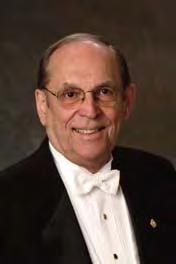
28 August/September 2014
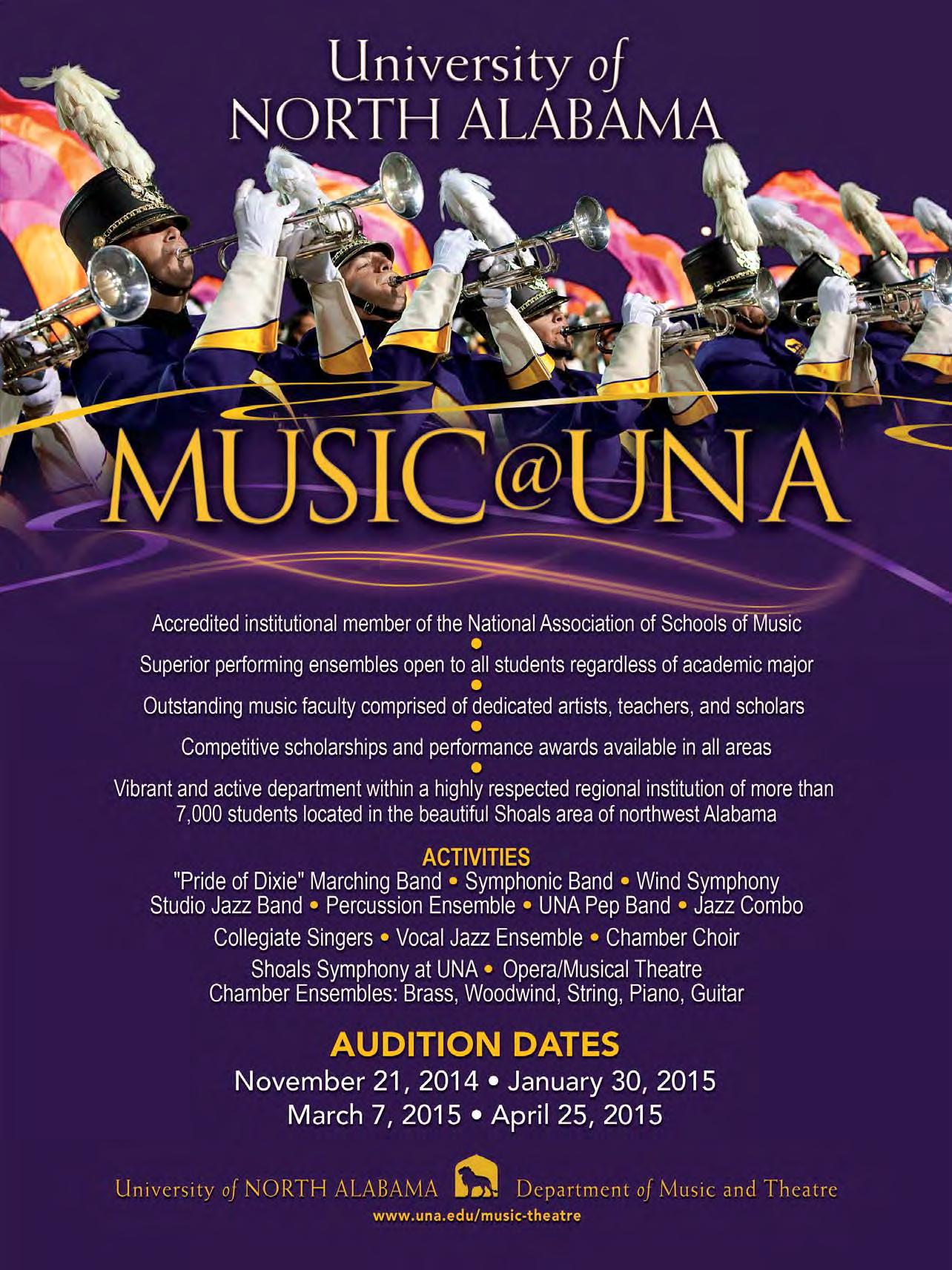
AMEADivision Events 2014 - 2015
Alabama Bandmasters Association
AMEA In-Service Conference/All-State Jazz Band
January 22-24, 2015 - Renaissance Montgomery Hotel at the Convention Center All-State Solo Festival
April 15, 2015 - Location TBA
All-State Band Festival
April 16-18, 2015 - Mobile Convention Center
Summer In-Service Conference
June 23-25, 2015 - Hampton Inn and Suites, Orange Beach
30 August/September 2014 District I District Fall Meeting August 25, 2014 Location TBA All-State Band Auditions January 30-31, 2015 Sparkman HS District Honor Band February 13-14, 2014 Bob Jones HS State MPA I February 26-27, 2015 Location TBA State MPA II March 12-13, 2015 James Clemons HS Solo and Ensemble Festival April 11, 2015 Location TBA Solo and Ensemble Festival May 2, 2015 Location TBA District II District Fall Meeting August 19, 2014 Gadsden City HS All-State Band Auditions January 17, 2015 Albertville HS State MPA February 25-27, 2015 Gadsden City HS District Honor Band March 6-7, 2015 Albertville HS Solo and Ensemble Festival April 20, 2015 Arab HS Solo and Ensemble Festival May 4, 2015 Oxford HS District III District Fall Meeting August 2, 2014 Smith Lake All-State Band Auditions January 31, 2015 Muscle Shoals HS District Honor Band February 20-21, 2015 Russellville HS State MPA March 3-5, 2015 University of North Alabama Solo and Ensemble Festival May 2, 2015 University of North Alabama District IV District Fall Meeting September 15, 2014 Hoover HS All-State Band Auditions January 31, 2015 Gardendale HS State MPA (High School) March 3-5, 2015 Homewood HS State MPA (Middle School) March 10-12, 2015 Hewitt-Trussville HS District Honor Band March 20-21, 2015 Homewood HS Solo and Ensemble Festival April 21, 2015 Homewood MS Solo and Ensemble Festival May 2, 2015 Bumpus MS District Spring Meeting May 18, 2015 Location TBA District V District Fall Meeting August 25, 2015 Location TBA All-State Band Auditions January 31, 2015 Location TBA District Honor Band February 20-21, 2015 University of West Alabama District Spring Meeting February 21, 2015 University of West Alabama State MPA February 26-27, 2015 University of Alabama Solo and Ensemble Festival March 26, 2015 Prattville HS Solo and Ensemble Festival April 21, 2015 Tuscaloosa County HS District VI All-State Band Auditions January 31, 2015 Opelika MS District Honor Band February 21-22, 2015 Auburn HS State MPA March 9-11, 2015 Opelika HS Solo and Ensemble Festival April 11, 2015 Auburn JHS Solo and Ensemble Festival May 2, 2015 Trinity Presbyterian School District Spring Meeting May 11, 2015 Location TBA District VII District Fall Meeting August 25, 2014 Location TBA All-State Band Auditions January 17, 2015 Davidson HS State MPA March 4-6, 2015 Baker HS Solo and Ensemble Festival April 25, 2015 East Site - Location TBA Solo and Ensemble Festival May 2, 2015 West Site - Faith Academy District Spring Meeting May 4, 2015 Location TBA District VIII District Fall Meeting August 18, 2014 TBA All-State Band Auditions January 17, 2015 Troy Elementary School State MPA March 9-12, 2015 Enterprise HS District Honor Band March 13-14, 2015 Enterprise HS District Spring Meeting March 14, 2015 Enterprise HS Solo and Ensemble Festival May 2, 2015 Troy Elementary School Solo and Ensemble Festival May 9, 2015 Excel HS
Alabama Vocal Association
Elementary/General Division
October 3, 2014 Elementary Music Festival, Samford University, Dr. Michele Champion and Mr. Ken Berg
October 4, 2014 AMEA/ AOSA Fall Workshop, Gwin Elementary School Dr. Michele Champion and Mr. Ken Berg
October 26-29, 2014 NAfME National In-service Conference, Nashville, TN
November 5-8, 2014 AOSA Professional Development Conference, Nashville, TN
January 22-24 AMEA In-Service Conference, Renaissance Montgomery Hotel and Convention Center
AMEA Collegiate Division
October 11 - Collegiate Summit - University of Montevallo
January 22 - 24, 2015 AMEA Conference, Renaissance Montgomery Hotel and Convention Center
Alabama Orchestra Association
All State Audition excerpts posted online - August 11, 2014
All State Audition Registration Deadline - September 30, 2014 Composition Contest Deadline - October 1, 2014
All State Results Posted online - November 17, 2014
All-State Scholarship Application Deadline - December 1, 2014
All-State Festival - February 12-15, 2015
ala breve 31
Event Date Location All State Show Choir Audition 10/9 – 10/11 Gardendale-Mt. Vernon UMC, Gardendale All State Show Choir 1/22 – 1/24 Renaissance Montgomery All State Choir Auditions 11/13 Mt. Zion Baptist Church, Alexandria 11/14 and 11/15 Gardendale-Mt. Vernon UMC, Gardendale 11/17 Spring Hill Baptist Church, Mobile 11/18 St. James School, Montgomery 11/19 Florence HS, Florence 11/20 and 11/21 Willowbrook Baptist Church, Huntsville All State Choir 4/8 – 4/11 Samford University SCPA 2/23 and 2/24 Moody Building, UA, Tuscaloosa 2/23 and 2/24 and 2/25 Bluff Park, UMC, Birmingham 3/10 Southside Baptist, Decatur 3/11 University of North Alabama, Florence 3/13 FBC, Tallassee 3/16 and 3/17 James Clemens HS, Madison 3/19 Spring Hill Baptist, Mobile Solo and Ensemble 11/21 Spring Hill Baptist, Mobile 2/19 Jacksonville State, Jacksonville 2/23 and 2/24 Moody Building, UA, Tuscaloosa 3/7 Gardendale HS, Gardendale 3/11 University of North Alabama, Florence 3/13 FBC, Tallassee 3/19 Spring Hill Baptist, Mobile 4/20 and 4/21 Willowbrook Baptist, Huntsville OCS/OA/ME District I - 11/4 Florence HS, Florence District II – 11/20 Paul Bryant HS, Tuscaloosa District III – 11/3 Gardendale HS, Gardendale District IV – 11/20 Alexandria HS, Alexandria District V – 11/3 Randolph School, Huntsville District VI – 10/29 Tallassee
Tallassee District VII – 12/1 UMS-Wright
All events are open to all members, with the exception of OCS/OA/ME - adjudications must be completed within the district in which the school resides.
HS,
Preparatory School, Mobile
Why I Want To Be A Music Educator
Editor’s Note: AMEA recently awarded the first FAME (Future
Until eighth grade, school for me was a place to struggle through math problems, listen to lectures, and count down the minutes until lunch time. It was not until I agreed (although somewhat reluctantly) to join the middle school choir that I truly discovered what a difference the presence of music can make on education. This passion has flourished throughout my high school years and has influenced my decision to become a music educator, despite significant obstacles that come with diminishing arts programs.
Throughout middle school, I was always viewed as a "good student;" however, I was also unsure of myself and tended to be very submissive. However, at the urging of my director, I decided to audition for and eventually attend my first All-State Choral Festival, little knowing what an impact that it would ultimately have upon my life. For the next few days, I learned that music has the ability to communicate messages that reach the very depths of the human soul. I absolutely loved being part of a group that rehearsed to produce something so beautiful, glorifying God with our talents while telling a story to our listeners. At the end of the weekend, I came home transformed
by Patty Holley, FAME Scholarship Recipient
into a girl with a passion for the arts, one who desired for her own voice to be heard.
As a freshman the next year, I was shocked to discover that there was no existing choir program at the high school. Determined to keep choral music as an option, I along with a friend convinced the principal to create a choral class that had previously not existed at the school for about eight years. The school band director also became our choir director, taking the necessary praxis and becoming certified with the Alabama Vocal Association. Although the class has never numbered over six students (in fact, I am the only one at present) I continuously find joy in the fact that even a few of us were able to have had music play a role in our high school careers. I and another friend have been blessed enough to return to All-State for multiple years.

Along with choir, I have also participated in musical theatre and have several close friends in marching band. Over the years, I have heard time and time again that for several students, these programs give them a place to belong, and for some, are the only bright aspects of coming to school. I began to realize more and more
how large of an influence that the arts, and specifically music, can make on an education. I have seen students who, while they might not excel in a traditional academic setting, flourish as soon as a piece of music is put in front of them. This is due to the overwhelming power of music to communicate messages that are unexplainable by theorems or algorithms. I found that music comes not as much from the brain as it does from the soul, and I began to long for all students to have the opportunity to be a part of music in this way. What better way to accomplish this, I thought, than to become a music educator myself?
Sometimes I find myself wishing that I could have been part of a large choir with ample funding, but then I realize that the determination of our small program truly demonstrates what a love for music is truly about. For this reason, I specifically hope to teach as a choir director at a school without a previously existing program.
I hope to obtain a bachelors and then a masters degree in music education before teaching choir in a high school setting. I wish to use my God-given gifts and talents to minister to students through choir music, and to advocate for music programs in every school. I long for the chance to further a student's ability to bloom musically in hopes that they will one day advocate for music education themselves. As a teacher I hope to reach beyond barriers created by low selfesteem and neglect in order to inspire a love for learning and overall selfconfidence. I hope to leave a lasting impact on students' lives by ministering to them musically, and help others develop their own talents, despite all attempts to deprive our schools of music. If awarded the scholarship, fulfilling my dream of becoming a music educator would be brought even closer to becoming a reality.
32 August/September 2014
Alabama Music Educator) Scholarship to Patty Holley, a 2014 graduate of Elmore County High School. Scholarship recipients must have attended the FAME program and plan to major in music education at an Alabama university.
UNIVERSITY OF SOUTH ALABAMA
DEPARTMENT OF MUSIC
Audition
udition
Dates: ates:
DEGREES:

S










Saturday, November 8, 2014

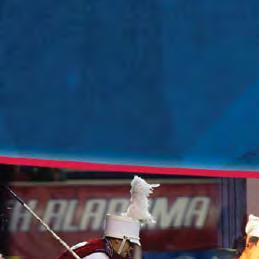
BM with Concentration in Music Education (Instrumental and Vocal)




MM with Concentration in Music Education (Instrumental and

Saturda
Saturday, February 14, 2015








Saturday, March 14, 2015

















Saturday, April 4, 2015
Additional Dates Available by Request
BM with Concentration in Performance (Instrumental and Vocal)
BM with Concentration in Elective Studies (Business or Specific Outside Fields)

MM with Concentration in Music Performance (Piano and Vocal)
MM with Concentration in Collaborative Keyboard
The University of South Alabama Department of Music, through its innovative curriculum, empowers professional musicians, music and those who wish to enrich their lives through the arts. The Department serves the needs of the University to promote genera provide a vital cultural link to the great state of Alabama and to the Gulf Coast region. Its excellent facilities and faculty, promotion of technology, and dedication to life-long learning provide a wide spectrum of experiences for both the student and the community.
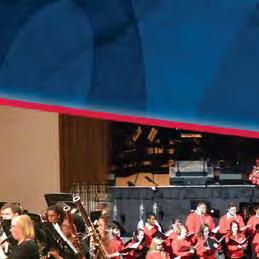
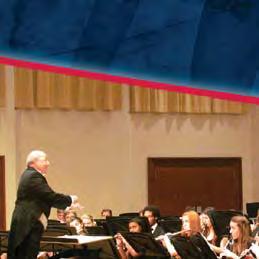
INSTRUMENTAL ENSEMBLES
Wind Ensemble
Symphony Band
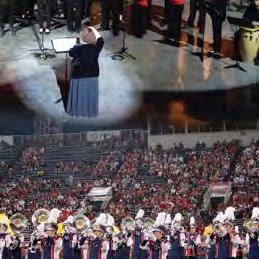
Symphony Orchestra
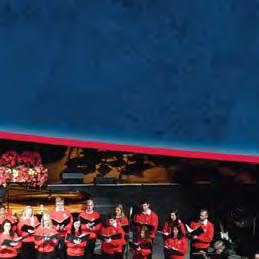
String Ensemble
Jaguar Marching Band
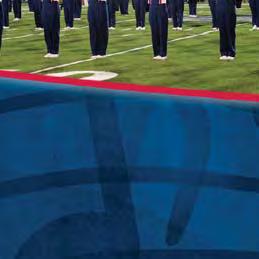
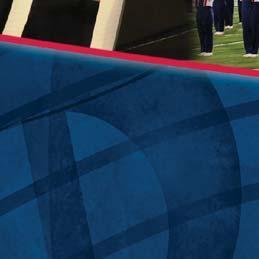
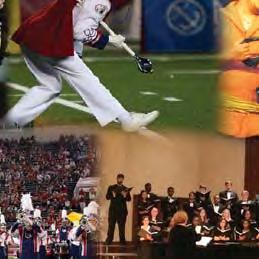
Jaguar Pep Band
Jazz Ensemble
VOCAL
CHAMBER ENSEMBLES






Trumpet Ensemble
Trombone Ensemble
Tuba Euphonium Ensemble
Chamber Brass Ensembles
Chamber Woodwind Ensembles

Percussion Ensemble
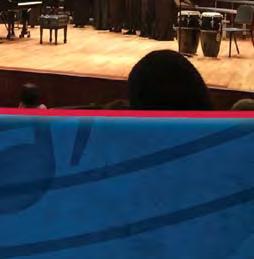
USA Steel Band
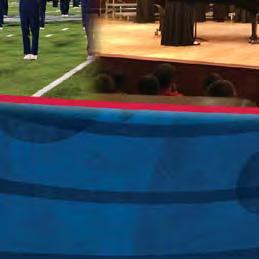

USA World Music Ensemble
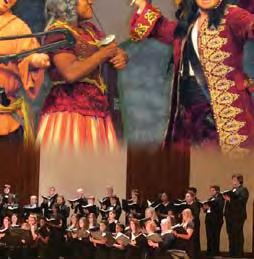
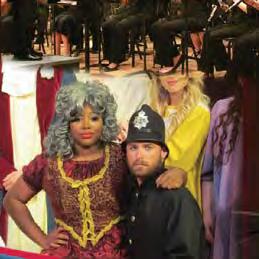
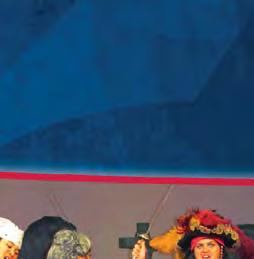
Piano Ensemble
Guitar Ensemble
The Music Starts Here
University of South Alabama, Department of Music Laidlaw Performing Arts Center, Room 1072, 5751 USA Drive South, Mobile, AL 36688
ENSEMBLES University Chorale USA Opera Theatre USA Concert Choir
aturday,
Novemb emb , aturda
ebruar
t rd M r h arch aturda er 8, 2014 ber 2 y 14, 201 5 , 2 y 14 14 201 5 , ch April 4 pril 4 , aturda Additi it onal Dates Available ailable dditional , , 2 , 201 5 , 2 Reque t equest s e b
, Februar
, F aturday S
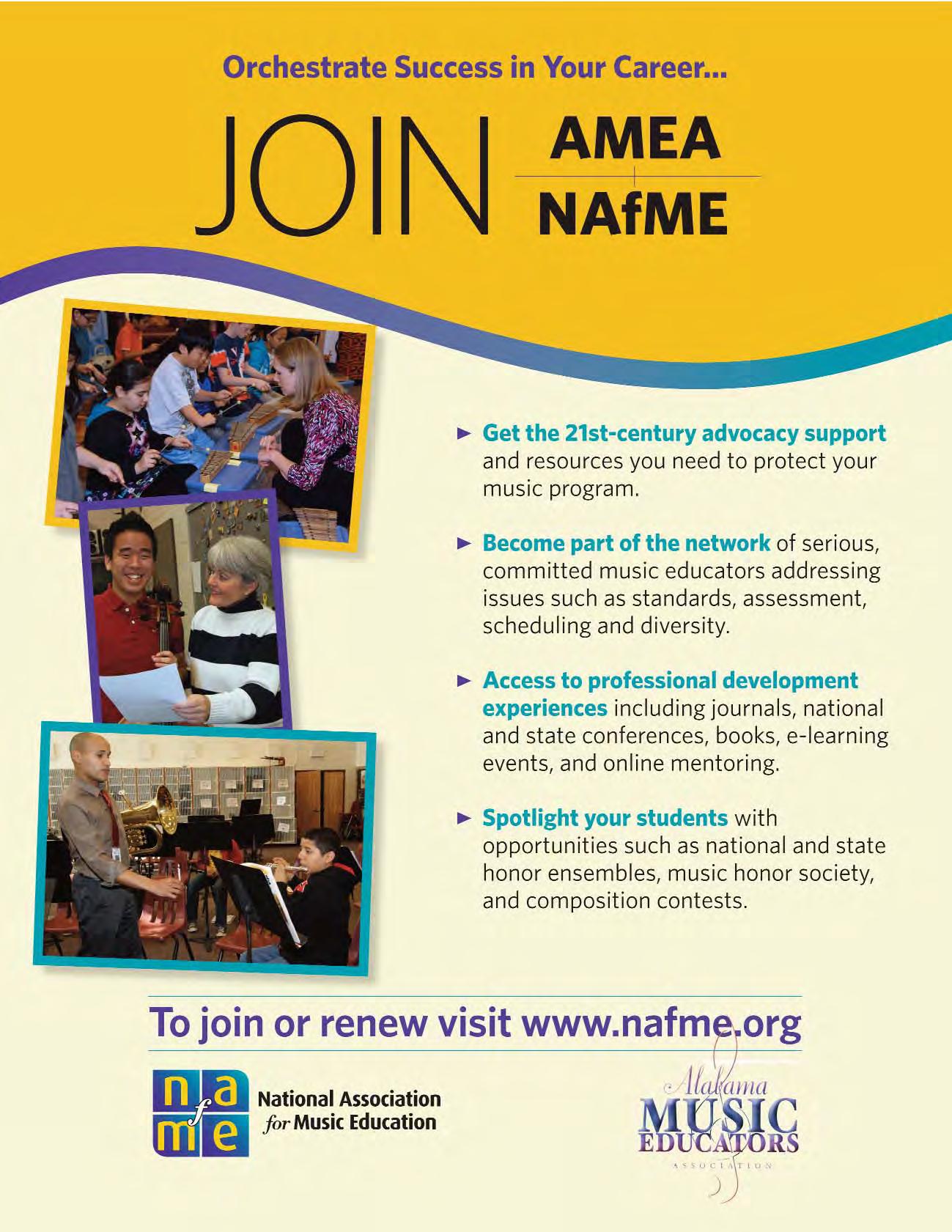
Listen and Learn: The Key to Effective Secondary General Music Instruction
by George Ober and Joe Pergola
We propose that it’s time for all secondary general music teachers to employ the skills and techniques necessary to create a stimulating and effective secondary general music program in all our schools.
Teaching secondary general music can be one of the most challenging and one of the most rewarding courses for music teachers. The multitude of requests for guidance regarding curriculum and learning goals on social media teacher sites demonstrates widespread concern about teaching this subject. There is no question that secondary general music instruction instills significant discomfort in teachers who are assigned a full schedule or just a single section.
Issues in Secondary General Music Education
Why do so many secondary music educators feel insecure when asked to teach general music? Perhaps it’s the amount of preparation necessary to teach a music course to predominately non-performing music students! Maybe it’s the lack of a unified sequential curriculum! Possibly it’s question of which materials will be useful! Maybe it’s the fear of disciplinary issues due to a lack of confidence in the lessons being taught! Whatever the reason, music educators desperately need resources and a research based curriculum designed specifically for today’s secondary general music student
Learning Goals for Secondary Education
It’s important to ask ourselves the following question. What are the essential skills and knowledge that all students should learn. For some educators the primary goal is to have students perform on instruments such as recorder, guitar, percussion and electronic keyboard? In other programs the most important skillI is for all students to know how to read and write traditional musical notation? From a humanities perspective the primary goal may be to understand music history?
However, since the vast majority of students required to take secondary general music are not members of a school performing group,
the most important goal must be the development of “listening skills”.
The Importance of Aural Skills
We live in a world where MTV, VH1 and YouTube have replaced aural acuity with visual imagery, the need to increase our students ability to better appreciate music by developing listening skills is essential. We need to help our students develop the aural skills necessary to perceive the expressive qualities inherent in various musical styles.
Instructional Sequence
This can be accomplished by having students understand and recognize the basic elements of music such as beat, tempo, dynamics, rhythm, instrumentation and form. The development of independent listening skills for each basic element provides the building blocks for the ability to a) hear, b)describe and c) identify the qualities inherent in music of varying style. By incorporating these basic skills into an instructional design, can help all our students cultivate the skills needed to demonstrate an aesthetic response to music.Initially, the basic elements of music should be described and discussed in nontechnical terms, supported by various learning activities involving description, creation and performance all in conjunction with appropriate listening examples.
Gradually, connections to proper terminology and musical symbols should be used to describe, analyze and assess listening examples.
Instructional Activities
(Beat/Tempo)
Students need to internalize beat and tempo. With repeated listening activities, students can learn to maintain a steady pulse in varying tempos by clapping or tapping.
(Dynamics)
The ability to recognize and identify various dynamic levels including crescendo and decrescendo is a listening skill all students can develop.
(Rhythm)
With developmental practice students can learn to audiate and perform notated basic rhythm problems. Have students learn to compose four (4) measure rhythm patterns.
(Form)
Using simple song form, (Intro, Verse, Chorus, Bridge) students can develop the listening skills necessary to graph song form.
True knowledge of the basic elements of music is exemplified by aural recognition and oral description. In other words, students must be able to recognize each element in isolation and in relationship to other elements present in the music. Students must be able to describe the function served by each element and how it is connected to the style being performed.
Conclusion
Each individual teacher must choose the best material suited for the level and age of their students. All styles of music should be employed; classical, jazz, rock etc. Emphasis should be placed on current popular styles because success in introducing students to new musical concepts is considerably easier when the student is dealing with familiar music. Plus, when students see that “their music” is accepted by the teacher, they are more receptive to listening and learning about other styles of music. Secondary general music teachers must stay open-minded and up to date with the ever changing styles of popular music.
It is time secondary general music develops a curriculum design and effective pedagogy that builds the listening skills necessary for students to better appreciate the expressive qualities inherent in all styles of music.
ala breve 35
PRE-REGISTRATION FORM
AMEA In-Service Conference
January 22-24, 2015
Renaissance Montgomery Hotel at the Convention Center
LAST NAME
FIRST NAME _____________________ (for badge)
NAfME ID#
Please enclose a copy of your card.
Home Address: (City)(State) (Zip)
Email:
Primary Phone:
School Name:
Principal Division:(check only one)
ABA AVA ELEM AOA HED COLLEGIATE
Other Division/s Affiliation:(check all that apply) ABA AVA ELEM AOA HED COLLEGIATE
Please tell us if you are:
First Year Teachers
Collegiate Members
Clinician Conductor of a performing group at the conferenceRetired Current Members, Clinicians, Conductors
Pre-Registration $85.00 (On-Site Registration $100.00)
Retired Members
Registration Complimentary
Pre-registration $65.00 (On-Site Registration $75.00)
Spouse* or Guest* of AMEA Member Registration $15.00 *may not be a music teacher Name
Pre-Registration $30.00 (On-Site Registration $45.00)
Non-Member Alabama Music Teacher
Pre-Registration $185.00 (On-Site Registration $195.00)
TOTAL AMOUNT PAID $ MAKE CHECKS PAYABLE TO AMEA A fee of $35 will be charged for returned checks No Purchase Orders Accepted. Check or Credit Card Only
To pre-register with a credit card go to www.alabamamea.org through January 8, 2015
Mail form and check by Jan. 8, 2015 to:
AMEA Registration, PO Box 3385, Muscle Shoals, AL 35661
Important: Forms and payment received after Jan. 8 will be held at the registration desk for onsite registration. Do not send forms or payment to the above address after Jan. 8, 2015!
THANK YOU! Your conference packet will be ready at the registration desk in the Renaissance Hotel. Your receipt will be in your packet at the conference. ********************************************************************************************************************************************
Please do not fill in the information below. This is for AMEA bookkeeping ONLY Personal Check #
Membership verified and payment receipted by:
Date:
School Check #
N Neew w A Addddrreessss! ! 36 August/September 2014
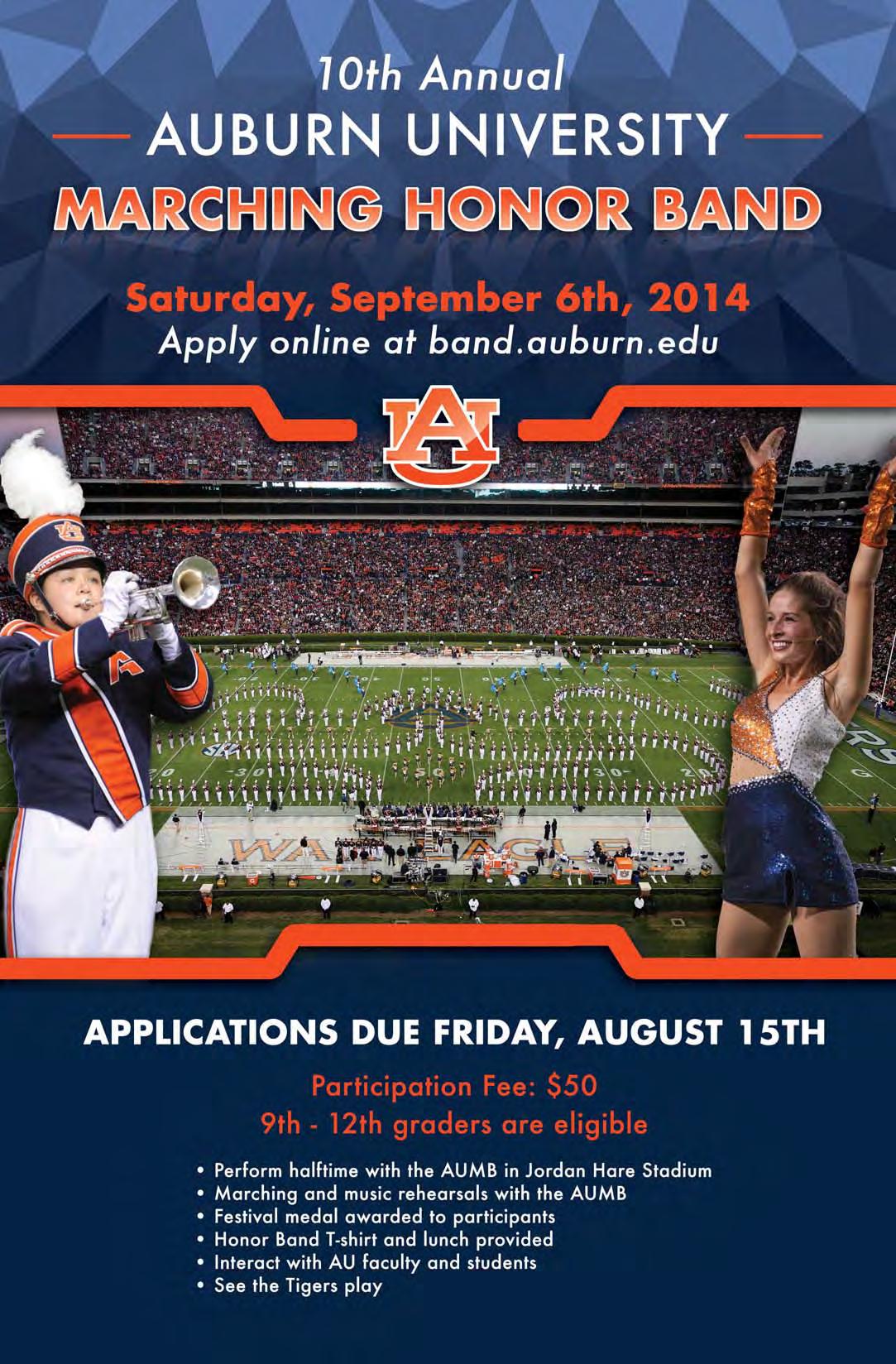
ALL-STATE JAZZ ENSEMBLE
Greetings! I hope everyone had a relaxing summer and a great start to the school year. In addition to marching band, fall is the time to help your students prepare for the all-state jazz ensemble auditions. Please check the ABA website for audition requirements and registration information. Students have to perform a recorded audition on CD, which consists of two jazz standards (which includes some improvisation), an etude, and some scales. I have tried to make the improvisation as logical and easy to understand as possible this year. Students should be able to improvise with just a few scales, so please don’t let your students get intimidated by the improv component. We have 2 high school and 1 middle school all-state jazz ensembles in Alabama. Last year we had 190 students audition for the bands, I would like to see this number grow substantially this year, so please encourage your students to audition for the band. We would really like to see the middle school numbers grow.
----Remember to allow enough preparation time to get recordings completed and mailed by November 7, 2014.


ALL-STATE JAZZ CLINICIANS
I am excited to report that we have three outstanding clinicians for the 2015 allstate jazz bands.
1. Dr. Tom Walsh will be directing the gold jazz band. Dr. Walsh is the director of jazz studies at the Indiana University Jacobs School of Music. He has an outstanding jazz program at Indiana, and he has performed all over the world as a saxophonist. Dr. Walsh holds 3 degrees from Indiana University.

2. Dr. Bob Lark will be directing the silver jazz band. Dr. Lark is the director of jazz studies at DePaul University in Chicago. He has performed with just about every big name jazz cat in the world, and has released many recordings with the DePaul jazz band. Dr. Lark holds a doctorate from the University of North Texas.
3. Sallie Vines White will be directing the middle school jazz band. Mrs. White has one of the strongest high school jazz programs in the United States at Hoover High School in Birmingham. Her “First Edition” jazz band performed at the Midwest Clinic in 2012 and the Jazz Education Network Conference in 2014. She holds a masters degree from Indiana University. All three of these clinicians are truly top-notch jazz educators, and I am confident they will provide an excellent experience for your students.
TIPS ON HELPING STUDENTS PREPARE FOR THE ALL-STATE JAZZ AUDITIONS


It is important that students learn style and the best way to learn this is by listening to other performers play jazz. We need to teach students to become connoisseurs and collectors of all types of music, especially jazz. They have lots of resources in their hands at all times by just accessing the internet and listening. I have been working on performing the jazz standard “You Don’t Know What Love Is,” and I wanted to get some additional interpretations. I looked on itunes and found 1,300 recordings of this song within a few seconds. I downloaded 5 versions by different artists in order to get a varying range of interpretations. Students can use this and youtube to learn the pieces for allstate jazz band auditions. Have your students download 5-10 versions of the audition pieces. They should listen to them as much as possible. They might try to do a “take-down” of the solos by writing them down on staff paper or using a music software program. They shouldn’t use these solos in their audition cd, but this is a great way to get ideas for their own improvisation and ideas for stylistic interpretation.
Please feel free to contact me if I can be of assistance to you in any way with your jazz programs, and I hope you will encourage your students to audition for the all-state jazz ensembles. I wish everyone a great school year.
Mark Foster, Jazz Chair 38 August/September 2014
AMEA Industry/Institutional Membership
AMEA recently launched an Industry/Institutional membership drive and would like to express appreciation to the following partners who have joined AMEA in our efforts to promote music education in Alabama. Please support these industry/institutional members who support you as music educators!
Art’s Music Shop, Inc.


3030 East Blvd. Montgomery, AL 36116 www.artsmusic.com
Group Travel Network, Inc. 410 N. Dillard St.- Suite 104 Winter Garden, FL 34787


www.grouptravelnetwork.com
AWB Apparel

206 Potomac Ct. Woodstock, GA 30188 www.awbapparel.com
J W Pepper & Son 9053 Riverside Parkway Lithia Springs, GA 30122 www.jwpepper.com

Gadsden Music Company
P.O. Box 132 Gadsden, AL 35902
www.gadsdenmusic.com

Mouchette Enterprises, Inc. P.O. Box 394 Northport, AL 35426

Southern Star Music Festival and Southern Star Festival of Champions 635 Sunset Dr. Norcross, GA 30071

www.starmusicfestivals.com
UNA Department of Music & Theatre UNA Box 5040 Florence, AL 35632-0001

www.una.edu/music-theatre
QuaverMusic.com 1706 Grand Avenue Nashville, TN 37212 www.quavermusic.com

Thomas Tours, Inc. 2405 12th Ave. South Nashville, TN 37204 www.thomastoursinc.com
University of South Alabama LPAC 1072, 5751 USA Drive, S Mobile, AL 36688 www.southalabama.edu/music
Marchmaster, Inc. P.O. Box 73379

Newnan, GA 30271
www.marchmaster.com
Springdale Travel/Student Tours 958 Montlimar Drive Mobile, AL 36609
www.springdaletravel.com
The University of Alabama Bands 211 Moody Music Building Tuscaloosa, AL 35487

www.bands.ua.edu

Bailey Brothers Music Company 4673 Highway 280 East Birmingham, AL 35242
www.baileybrothers.com

ala breve 39
Jane Kuehne, Research Chair

Ethics found in the Journal of Research in Music Education.
Research presented at other conferences will be considered. However, previously published work will not be accepted.
2015 CALL FOR RESEARCH ABSTRACTS

The Alabama Music Educators Association, Higher Education Division invites research poster submissions from all levels of music scholars and practitioners. Submissions may include completed and in-progress research studies involving any aspect of music (education, therapy, history, psychology, performance, music in higher education, etc.). Research based on issues facing music educators, musicians, and music students in the Southeastern United States are especially welcome, though this is not a requirement. All submissions should meet the Code of
Conference Days and Location. The AMEA conference will be Thursday, January 22, 2015 through Saturday, January 24, 2015 at the Renaissance Montgomery Hotel and Convention Center in Montgomery, Alabama. See http://www.alabamamea.org for more information.
Poster Session Day and Time. Friday, January 23, 2015, 11:30 a.m. – 1:30 p.m.
Proposal Submission. Interested researchers should submit a detailed abstract of the research project (up to 1000 words) as a Word or PDF document through our online submission website: http://amea-
research.org.
Deadline. Submissions must be received by 11:59 p.m. CST on Friday, November 14, 2014 for full consideration.
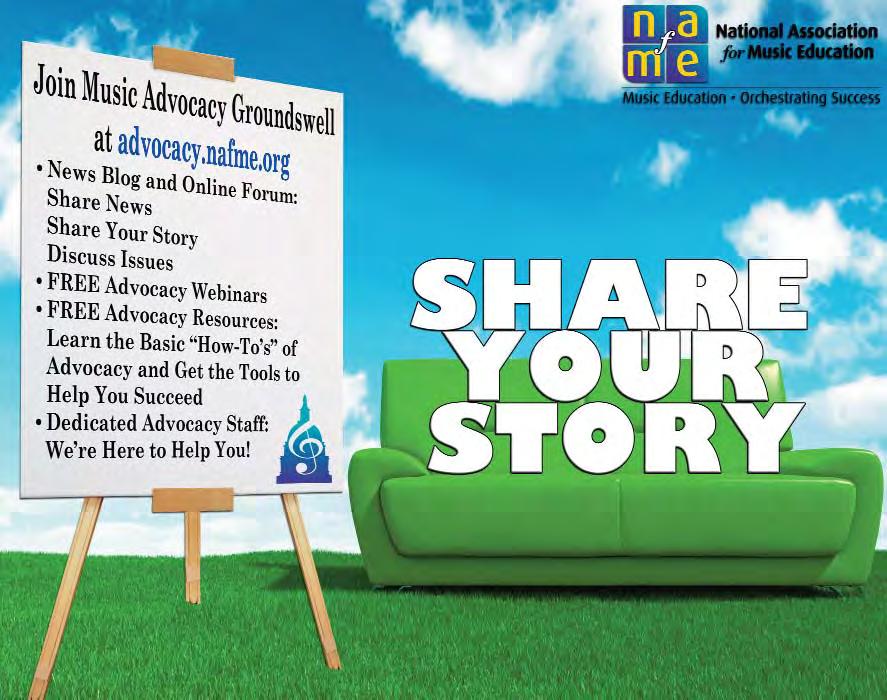
Process for Review & Notification. All abstracts will be peer-revised and authors will be notified of acceptance by Friday, December 5, 2014. When accepted, at least one of the authors must register and attend the AMEA Conference to present the poster.
Poster Dimensions. Posters should be professional in appearance and have poster dimensions of dimensions no larger than 36 inches X 48 inches. Presenters are expected to bring 20 copies of their research abstract to the session.
More Information. Contact Dr. Jane Kuehne at Auburn University by phone at (334) 844-6852 or by email at kuehnjm@auburn.edu.

40 August/September 2014
FAME Future Alabama Music Educators
Open to High School Juniors and Seniors
Thursday, January 22, 2015 9:00 A.M. - 4:00 P.M. Renaissance Montgomery Hotel at the Convention Center
Application and $20 registration fee are due postmarked no later than January 9, 2015
Student_____________________________________________________________ Grade ____________________
Nominating Teacher ____________________________________________ NAfME # _________________________
School Name ____________________________________________________________________________________
School Address __________________________________________________________________________________
Teacher Phone ________________________________ Teacher Email ______________________________________
This student participates in (circle all that apply): Band Chorus Orchestra
Publicity Waiver
I give AMEA permission to take photos of FAME attendees and use the photos for publicity purposes. By this authorization, I understand and agree that no participant shall receive remuneration and that all rights, title and interest to the photos and use of them belongs to AMEA.
Enclose $20 Registration Fee Make checks payable to AMEA
Signature of StudentSignature of Parent if Student is under 18
The FAME program includes many important topics for students considering a career as a music educator.
NEW! AMEA provides a $1000 scholarship opportunity to a FAME participant who plans to major in music education at an Alabama college or university. Visit www.alabamamea.org for details.
Lunch will be provided by AMEA
Mail this application, along with the $20 registration fee, to: Sara Womack, AMEA Past President 2130 Banberry Drive Hoover, AL 35244
Postmark Deadline: January 9, 2015
ala breve 41
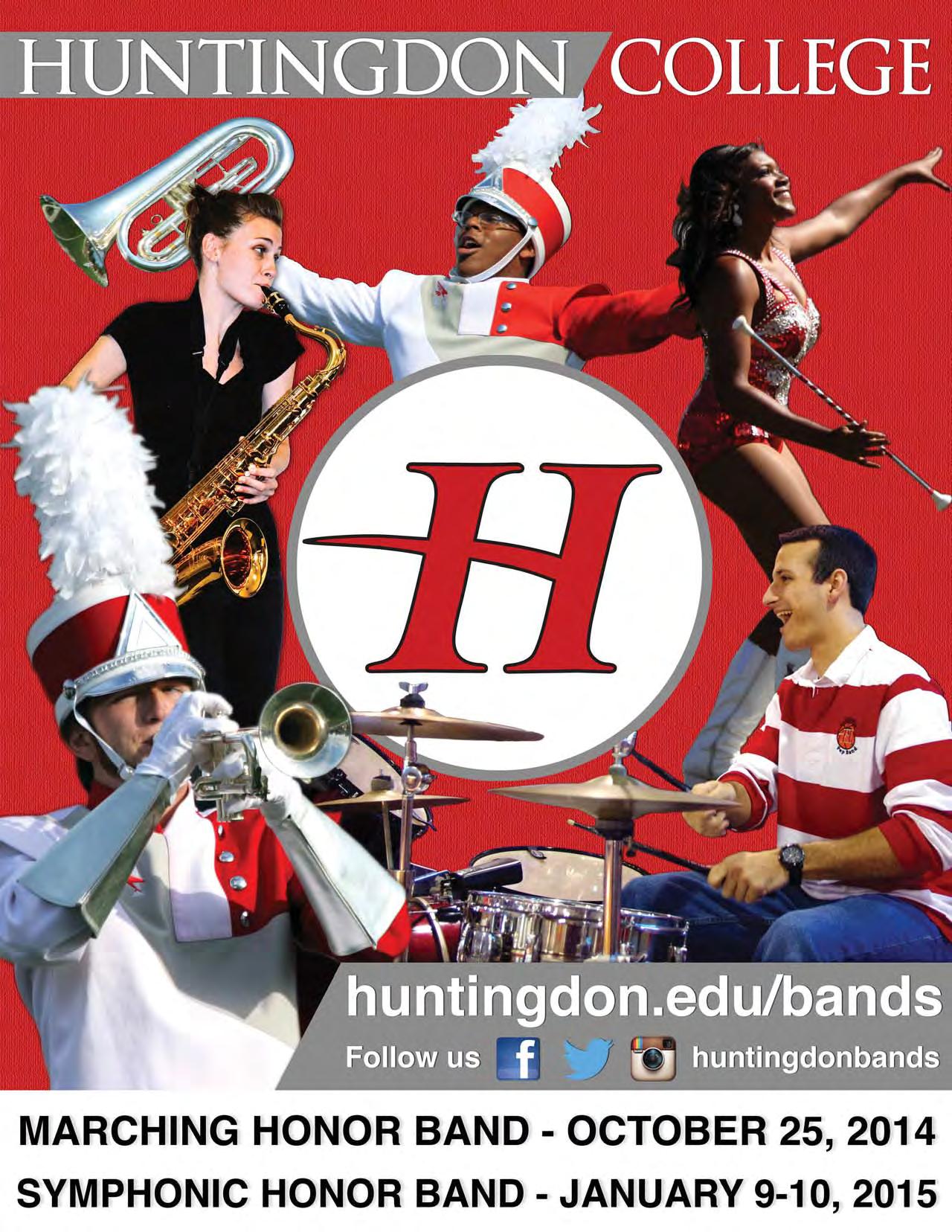
Landmark Music Festivals Landmark Music Festivals




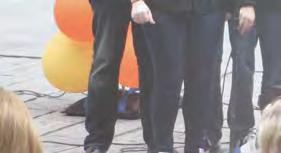

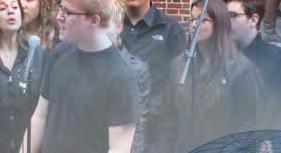
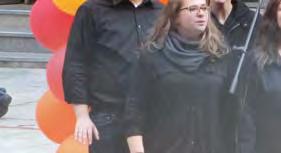














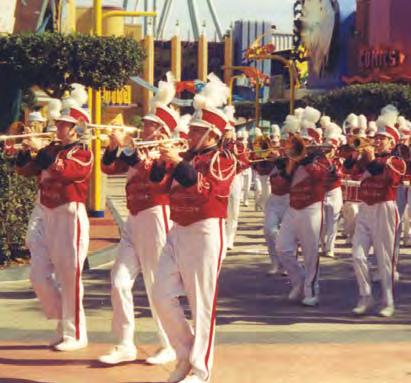

Landmark Tour & Travel’s Music Festival Coordinator, Connie Burleson, has more than thirty years experience as a choral music educator. She and her team of fully trained travel professionals can customize your tour to any major choral or instrumental festival at any location that you choose. (800) 681-4188 www.travellandmark.com (205) 714-7888 Festivals
Sample itineraries are available for each destination. If the festival or destination of your choice is not listed, call for a custom proposal. Contact Connie Burleson at (205) 714-7888 or IATAN International Airlines Travel Agent Network Music USA Orlando
Destinations
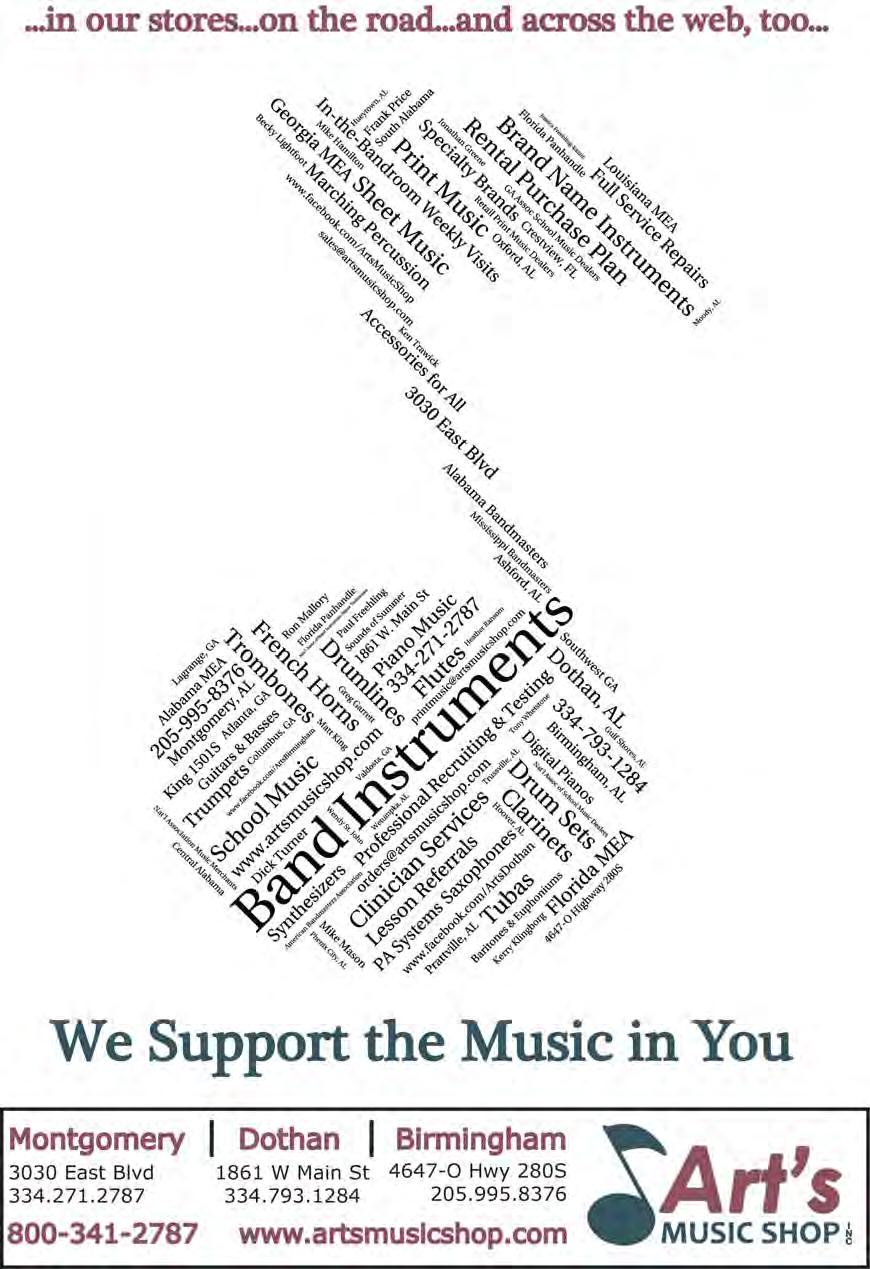
PRSRT STD US POSTAGE PAID Dothan, AL 36303 Permit No. 623





















































































 AMEA Collegiate Representative Mai Yamane, President-Elect Susan Smith, Jay Dunn & Morgan Carter (Legislative Assistants to Senator Richard Shelby) AMEA President Carl Hancock and Executive Director Garry Taylor
AMEA Collegiate Representative Mai Yamane, President-Elect Susan Smith, Jay Dunn & Morgan Carter (Legislative Assistants to Senator Richard Shelby) AMEA President Carl Hancock and Executive Director Garry Taylor

































































































 By Mai Yamane, CNAfME State Secretary for Alabama
By Mai Yamane, CNAfME State Secretary for Alabama














































































































